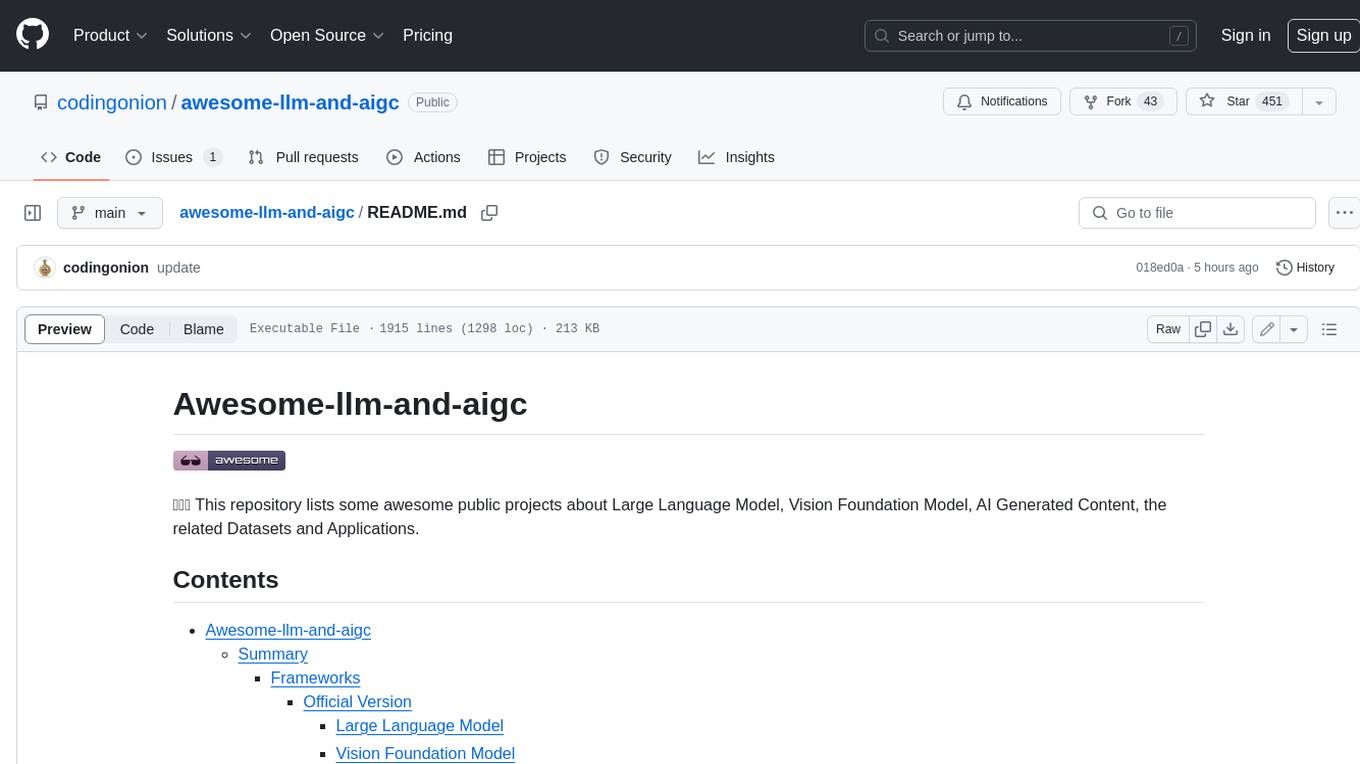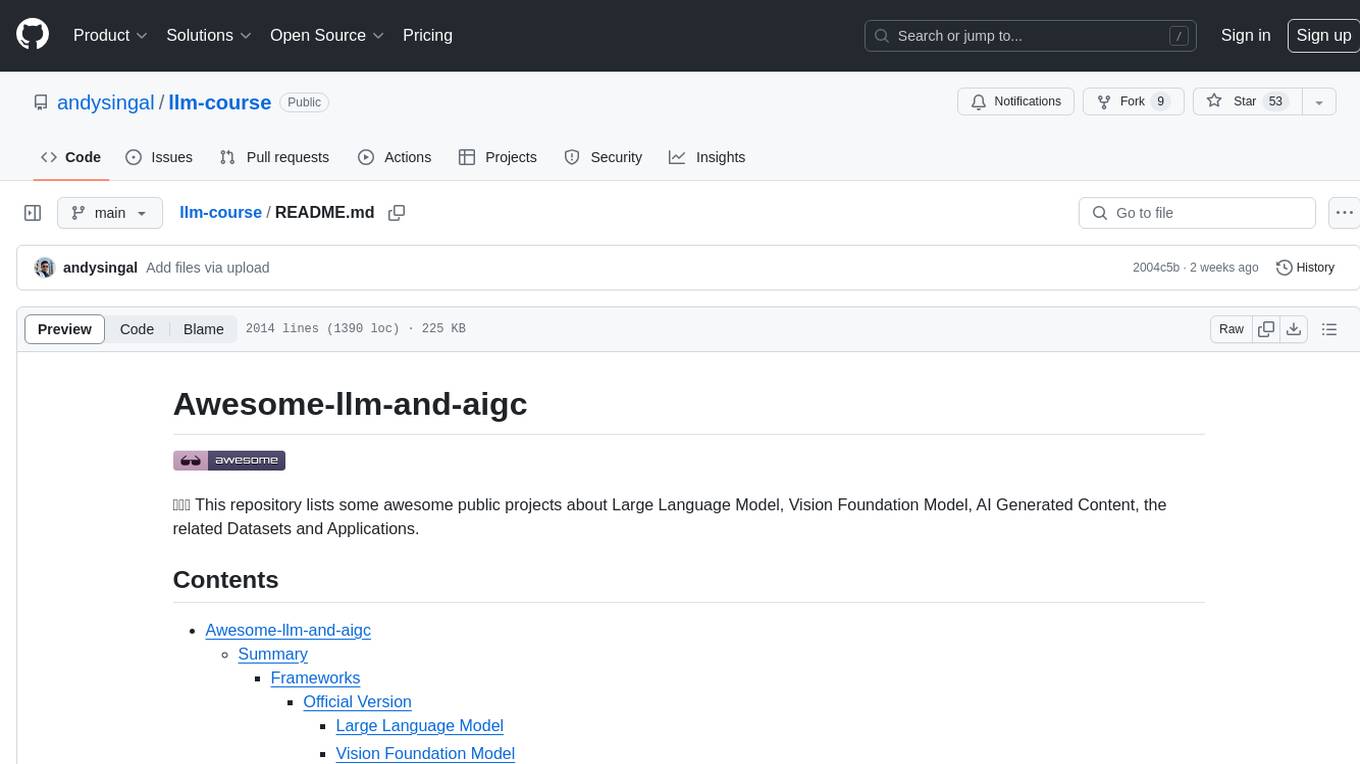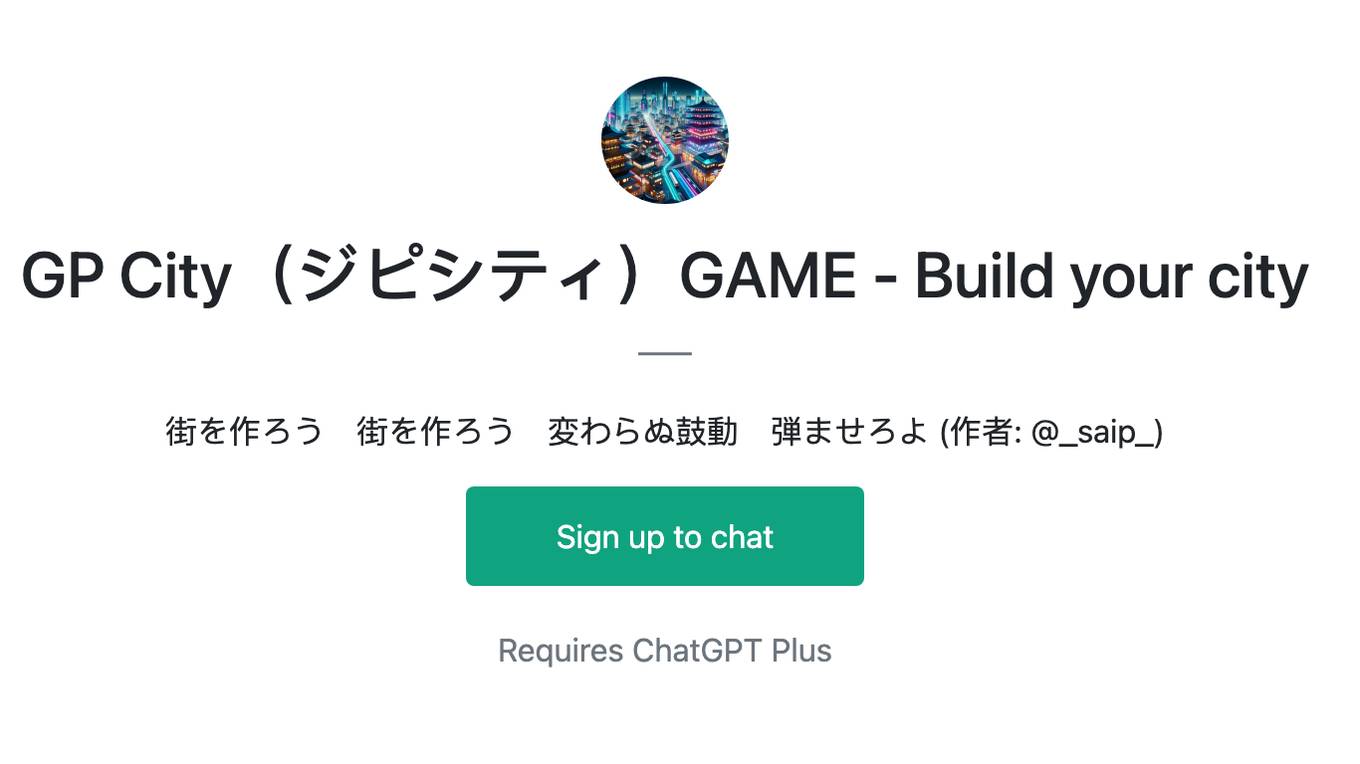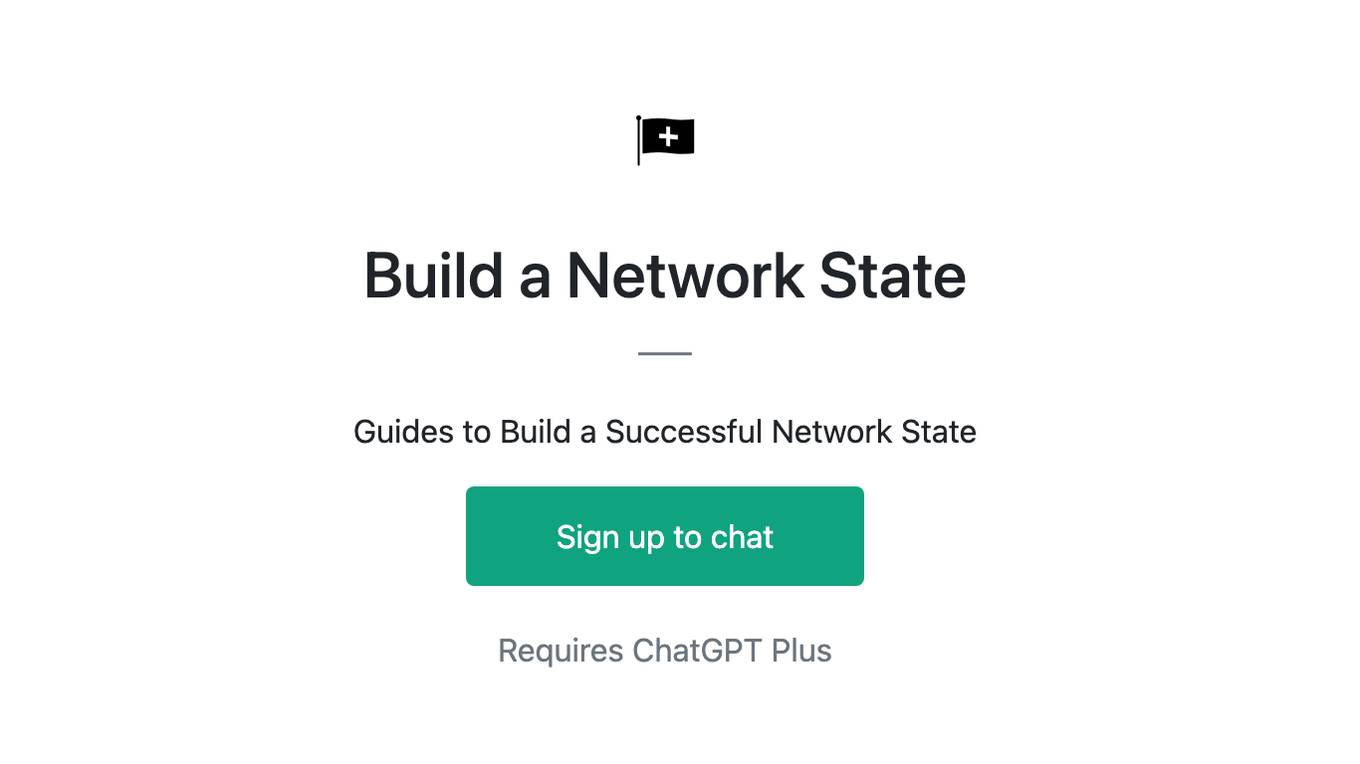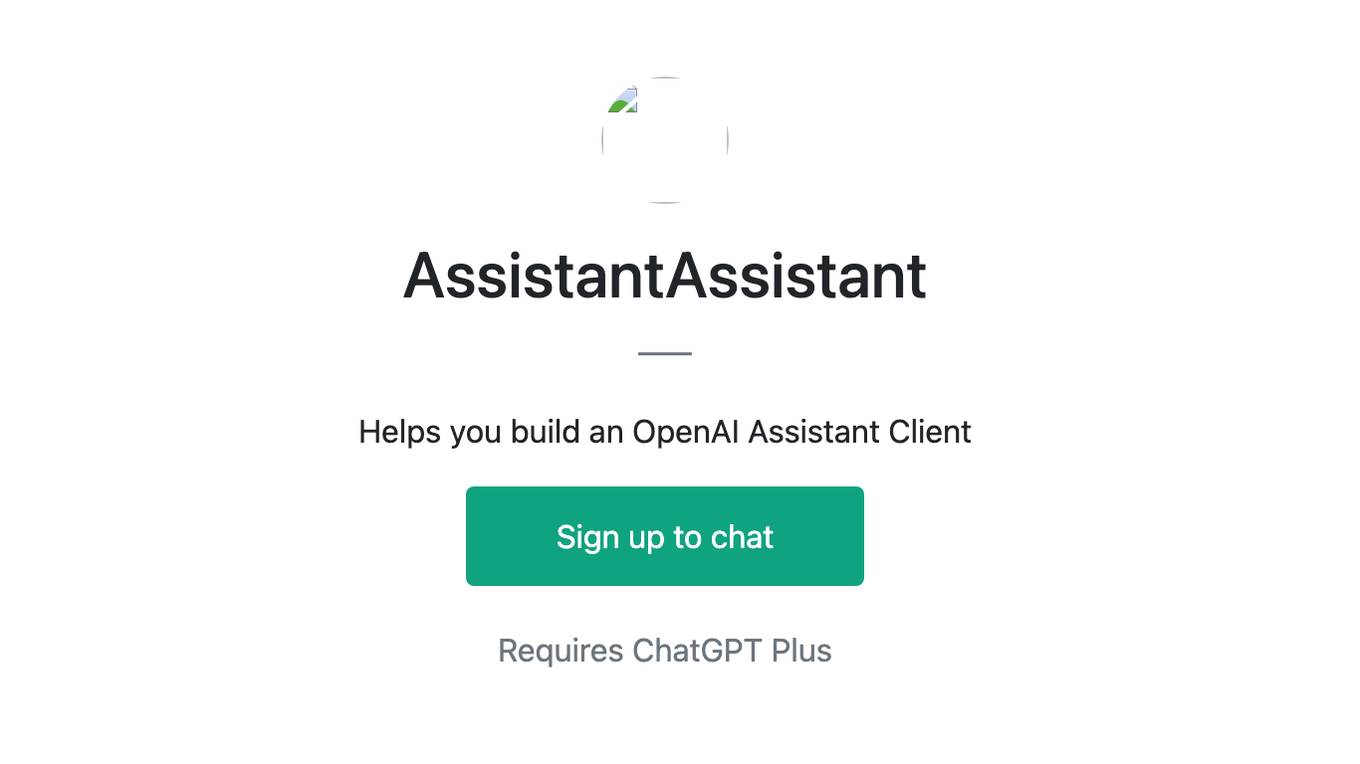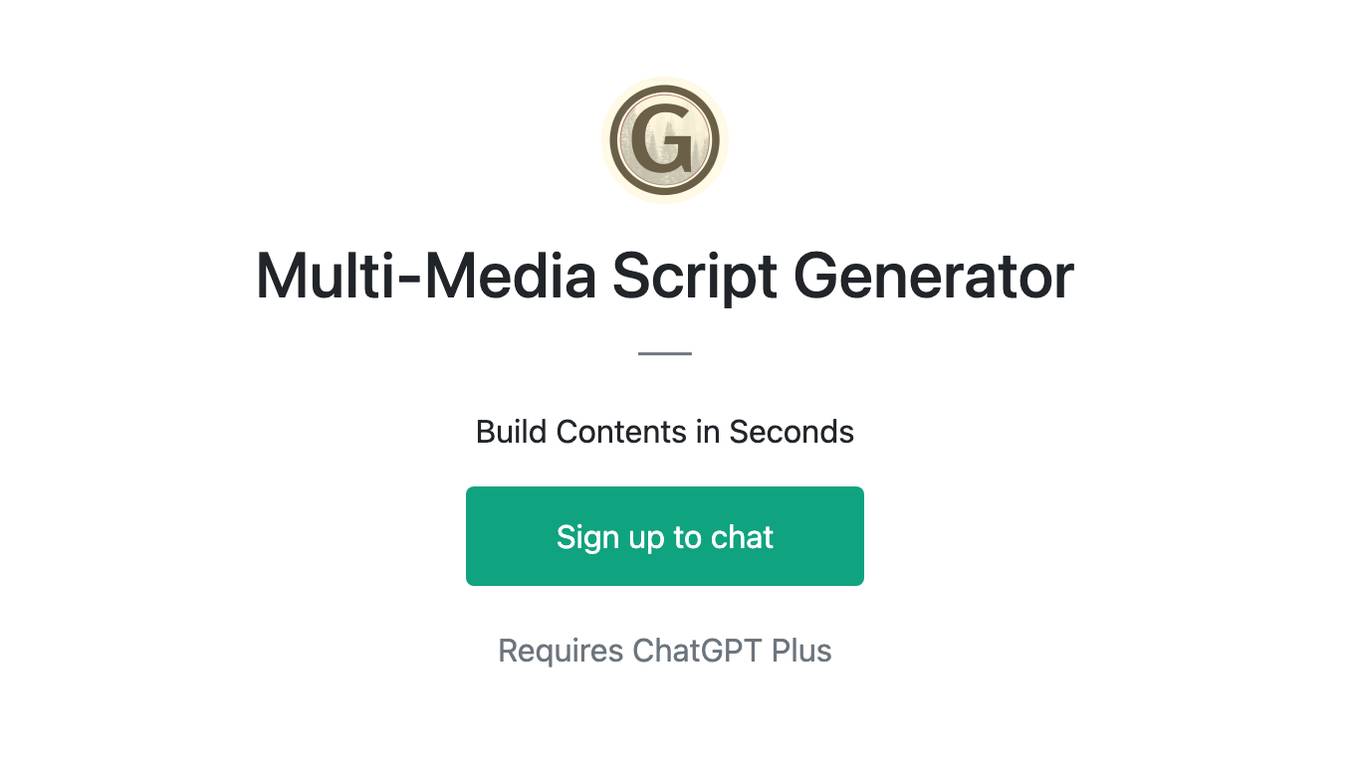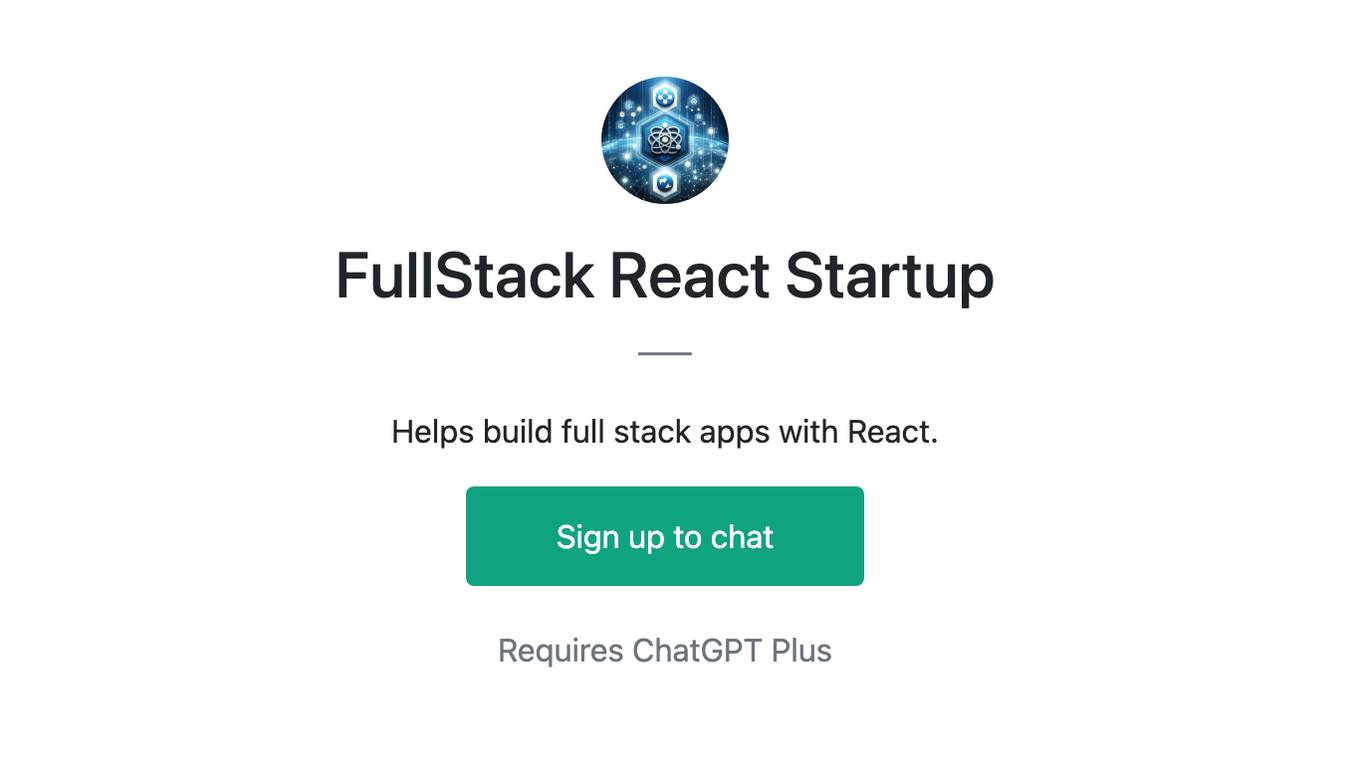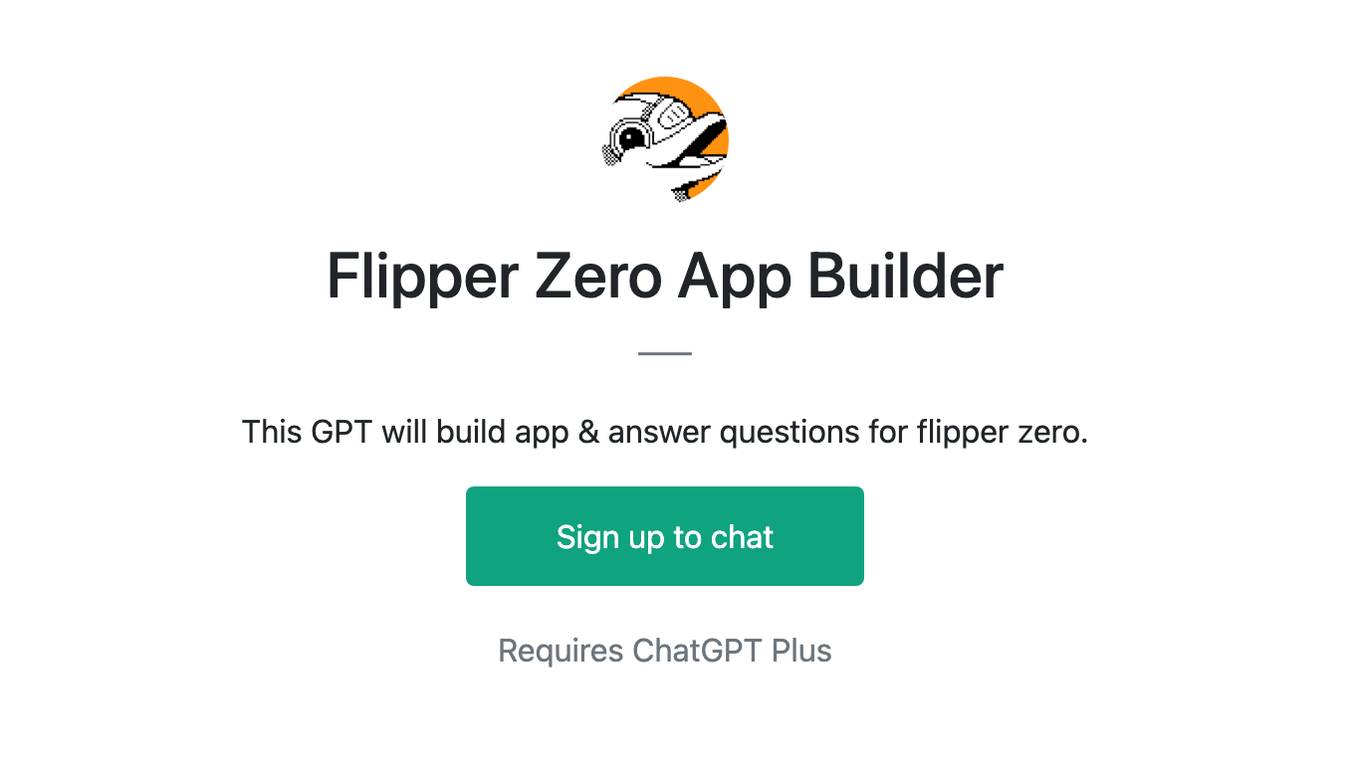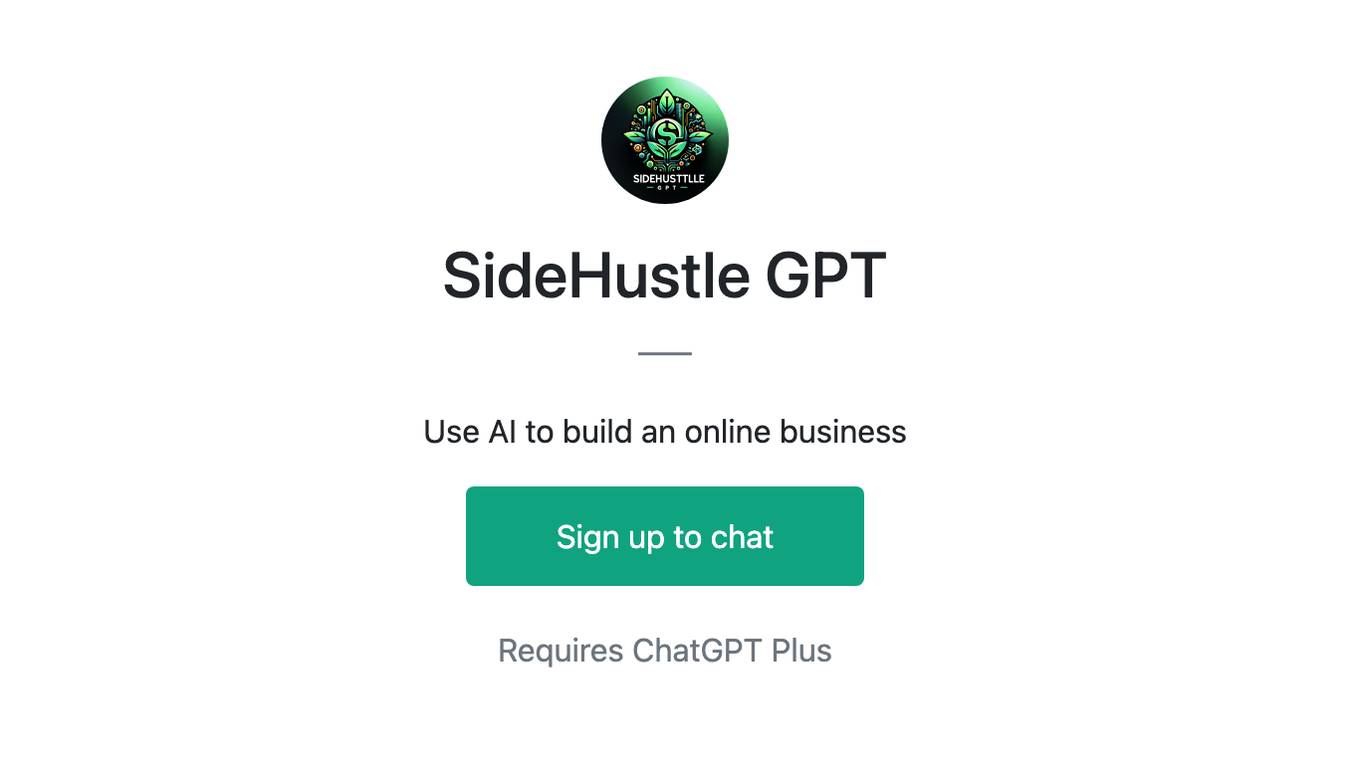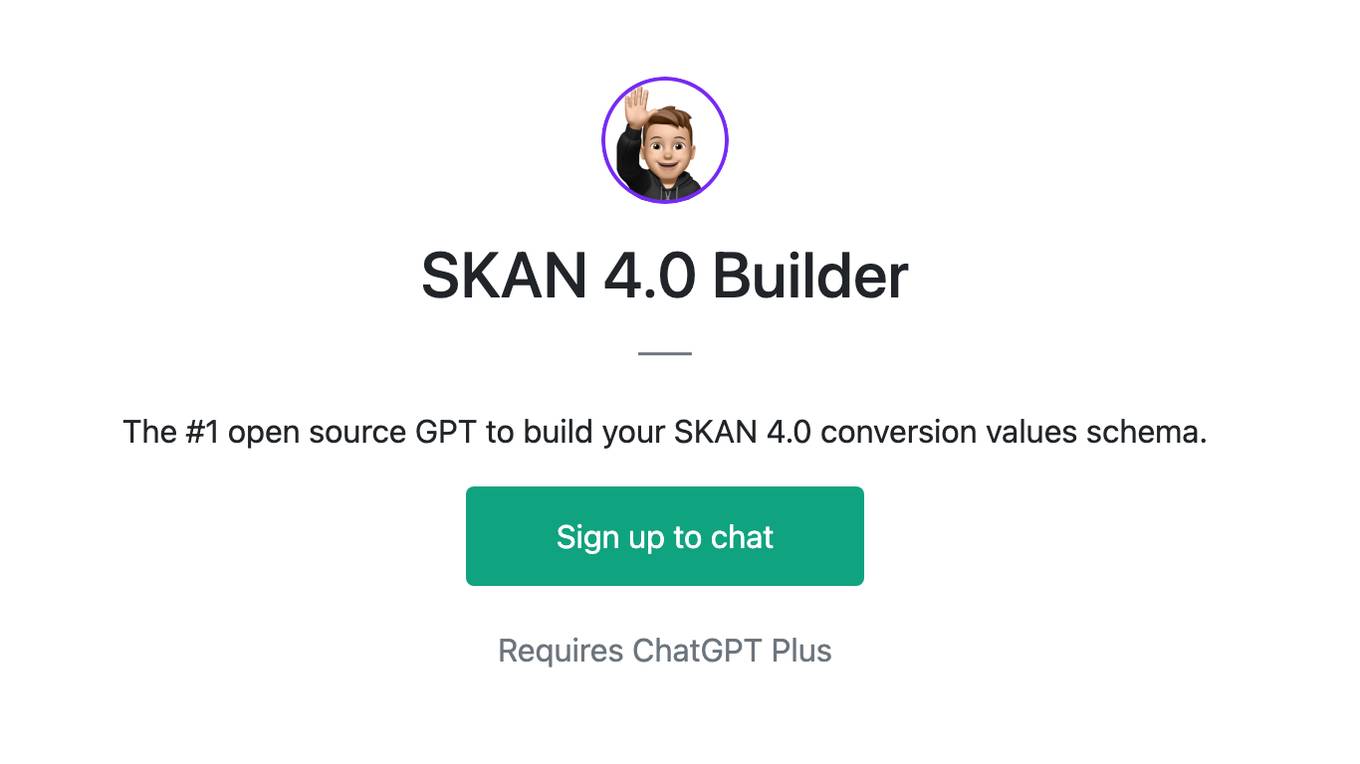Best AI tools for< build erp >
20 - AI tool Sites
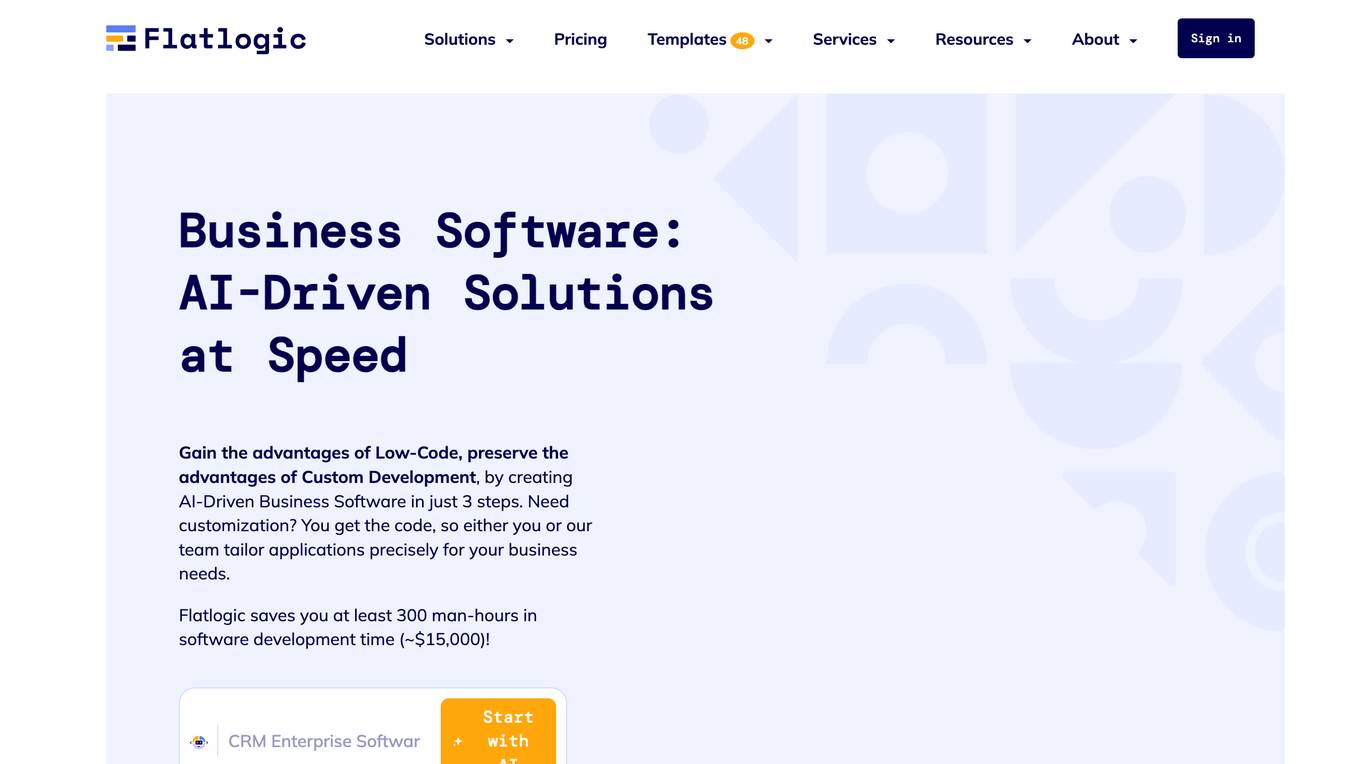
Flatlogic
Flatlogic is an AI-powered platform that enables businesses to create Business Software in just 3 steps. Leverage Flatlogic generator, templates and our customization services to save more than $15,000 while supercharging your business efficiency and growth.
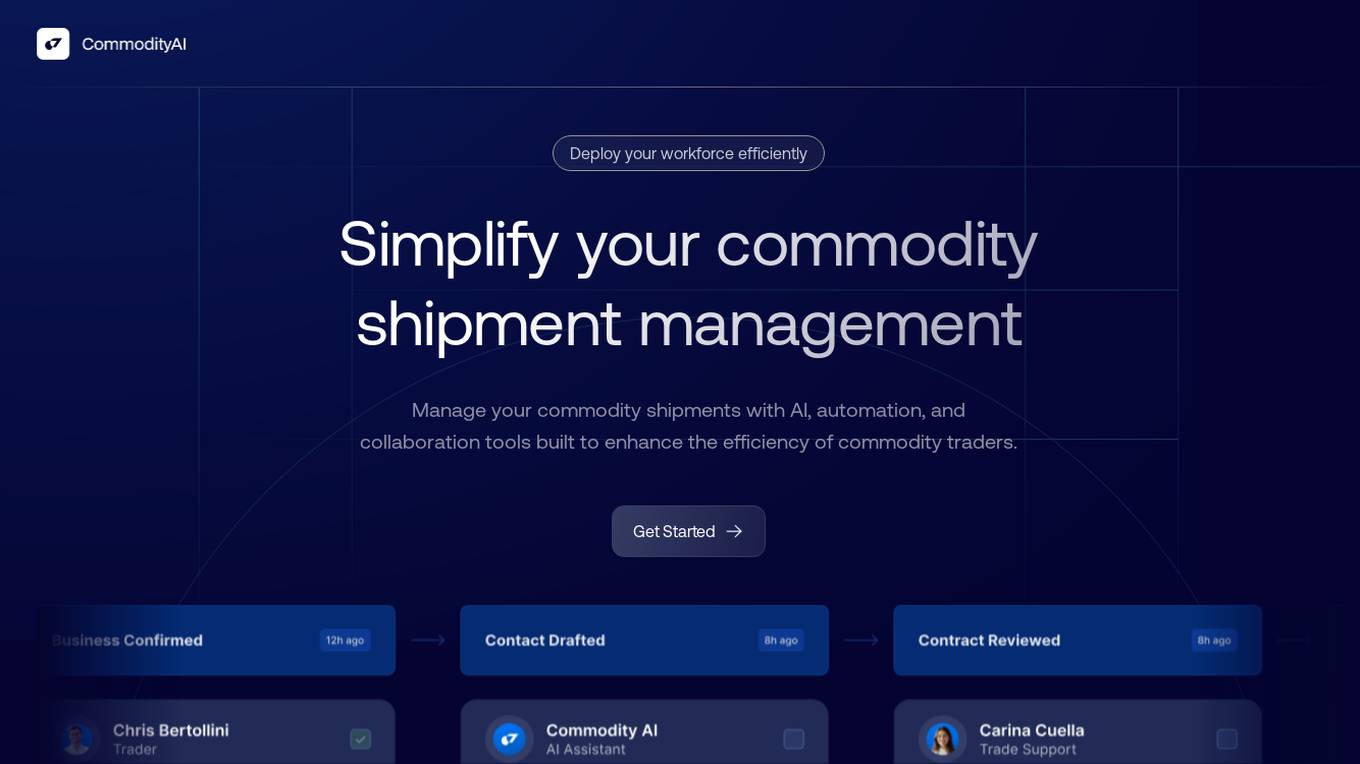
CommodityAI
CommodityAI is a web-based platform that uses AI, automation, and collaboration tools to help businesses manage their commodity shipments and supply chains more efficiently. The platform offers a range of features, including shipment management automation, intelligent document processing, stakeholder collaboration, and supply-chain automation. CommodityAI can help businesses improve data accuracy, eliminate manual processes, and streamline communication and collaboration. The platform is designed for the commodities industry and offers commodity-specific automations, ERP integration, and AI-powered insights.
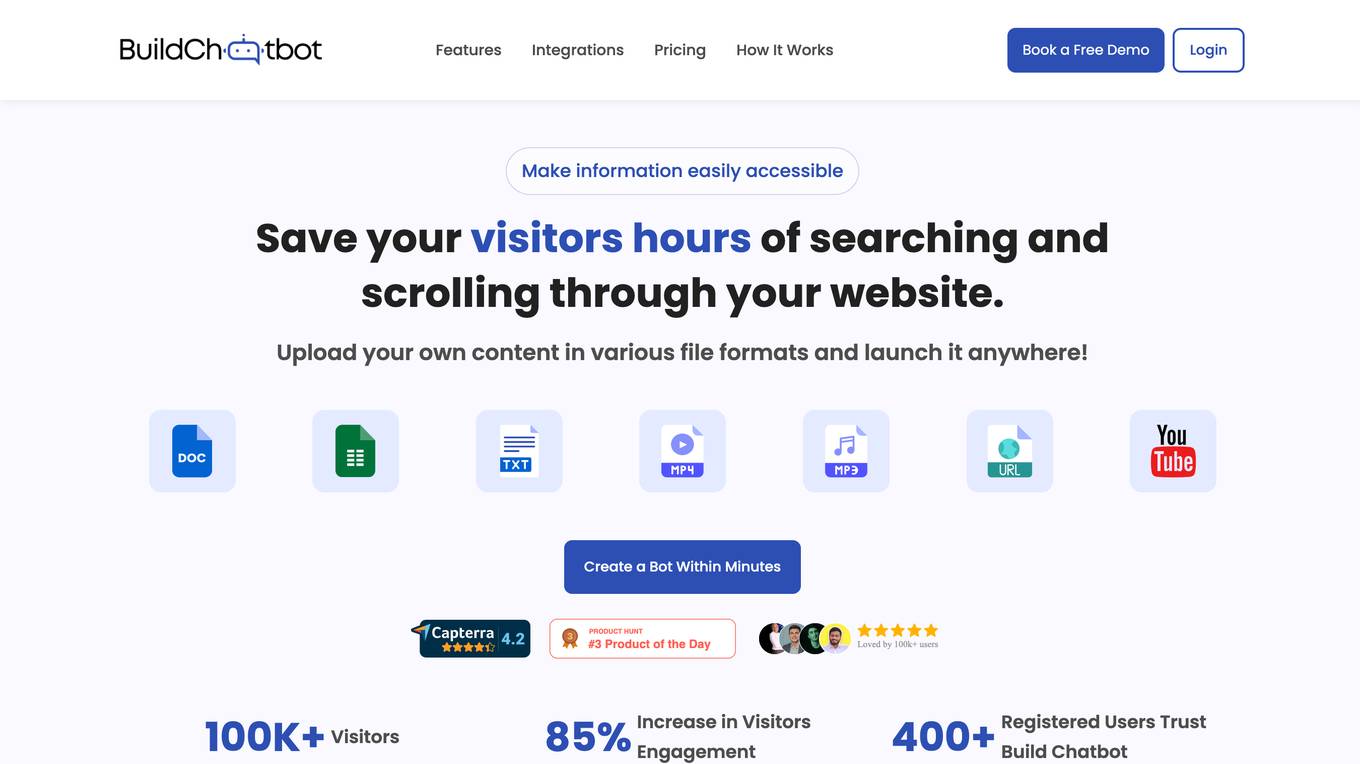
Build Chatbot
Build Chatbot is a no-code chatbot builder that allows users to create custom AI chatbots for their websites. With Build Chatbot, users can easily add a chatbot to their website to answer customer questions, provide support, and generate leads. Build Chatbot is easy to use and requires no coding knowledge. Users can simply upload their content, train their chatbot, and embed it on their website. Build Chatbot offers a variety of features, including: * **Customizable chatbots:** Users can customize their chatbots to match their brand and website. * **Multi-language support:** Build Chatbot supports multiple languages, making it easy to reach customers around the world. * **Live chat support:** Build Chatbot offers live chat support to help users with any questions or issues. * **Free trial:** Build Chatbot offers a free trial so users can try the service before they buy it.

Unified DevOps platform to build AI applications
This is a unified DevOps platform to build AI applications. It provides a comprehensive set of tools and services to help developers build, deploy, and manage AI applications. The platform includes a variety of features such as a code editor, a debugger, a profiler, and a deployment manager. It also provides access to a variety of AI services, such as natural language processing, machine learning, and computer vision.
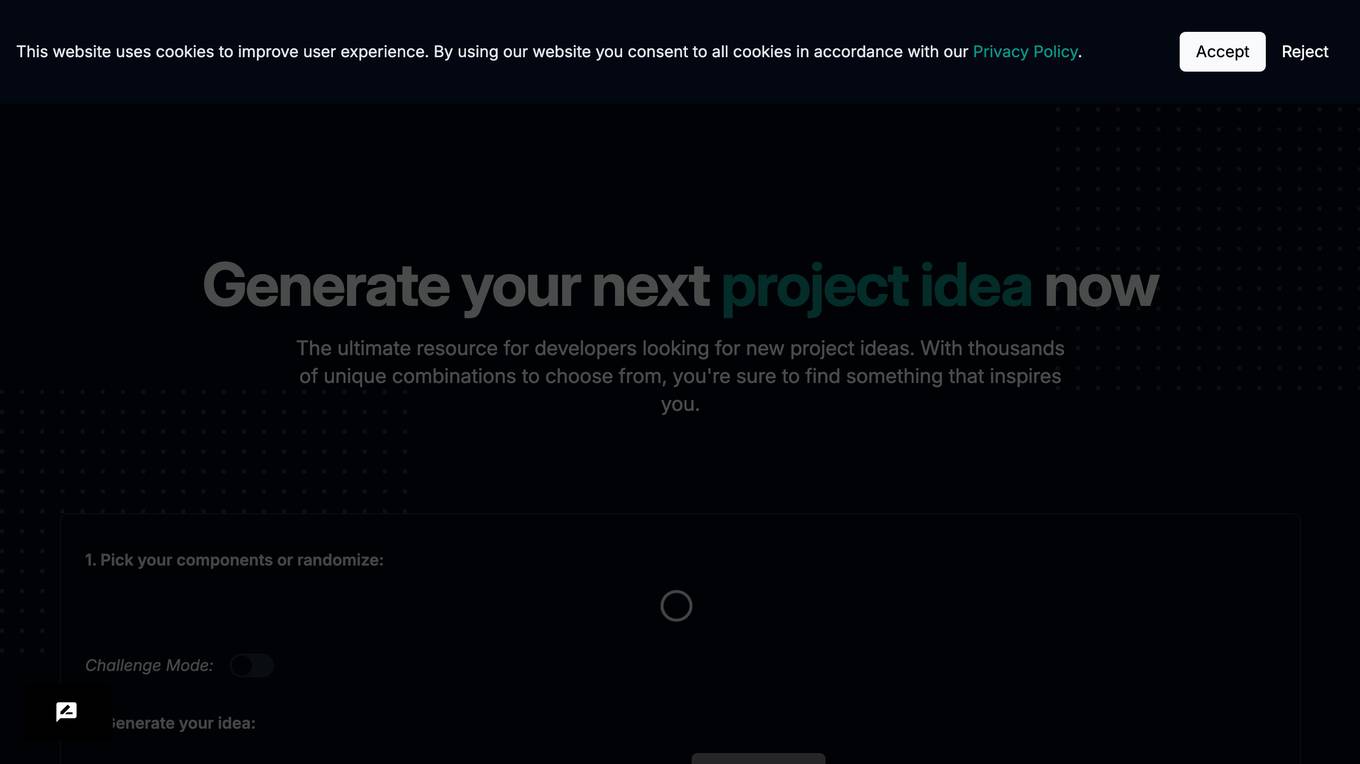
What should I build next?
The website 'What should I build next?' is a platform designed to help developers generate random development project ideas. It serves as an ultimate resource for developers seeking inspiration for their next project. With thousands of unique combinations available, users can easily find project ideas that spark their creativity. The site offers a Challenge Mode where users can pick components or randomize, and then generate their project idea. Additionally, free credits are rewarded to active users daily, ensuring a continuous flow of ideas. Overall, this platform aims to support developers in overcoming creative blocks and fostering innovation in their projects.
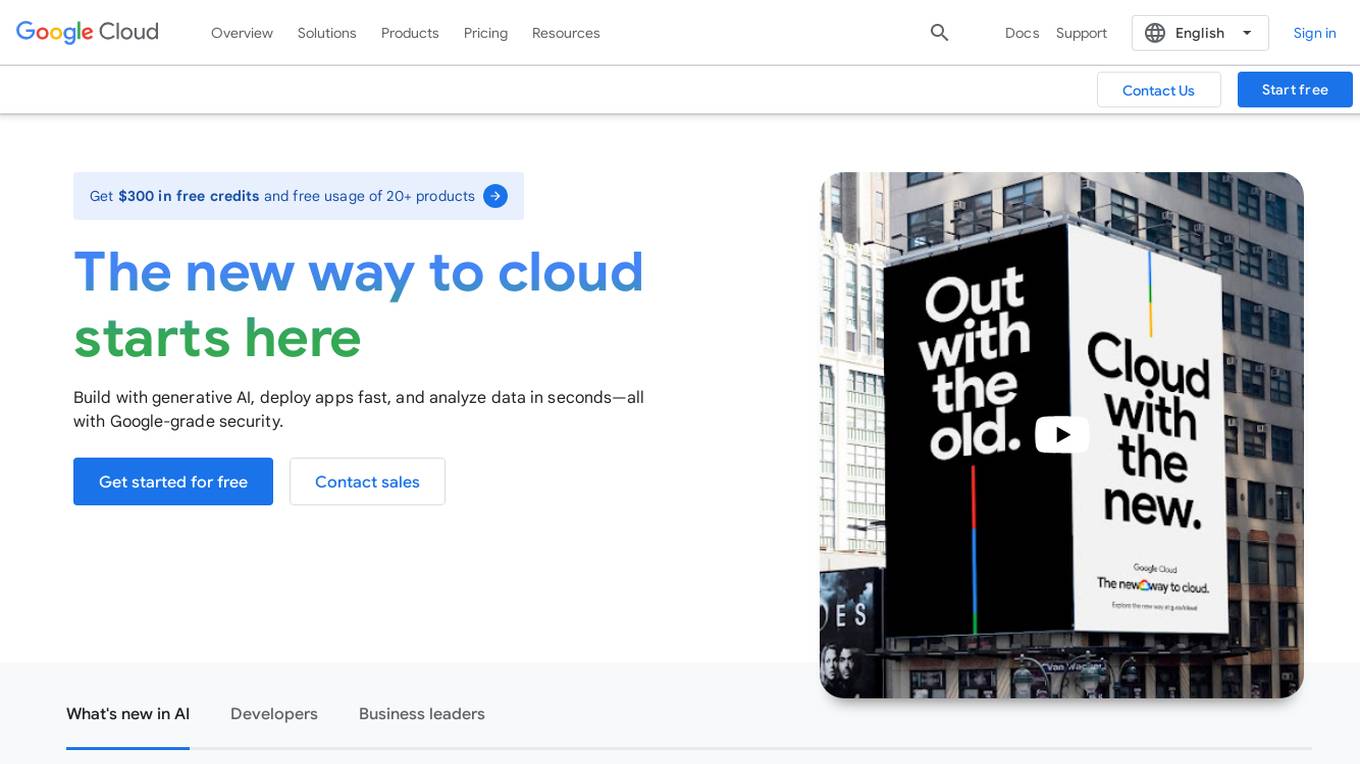
Google Cloud
Google Cloud is a suite of cloud computing services that runs on the same infrastructure as Google. Its services include computing, storage, networking, databases, machine learning, and more. Google Cloud is designed to make it easy for businesses to develop and deploy applications in the cloud. It offers a variety of tools and services to help businesses with everything from building and deploying applications to managing their infrastructure. Google Cloud is also committed to sustainability, and it has a number of programs in place to reduce its environmental impact.
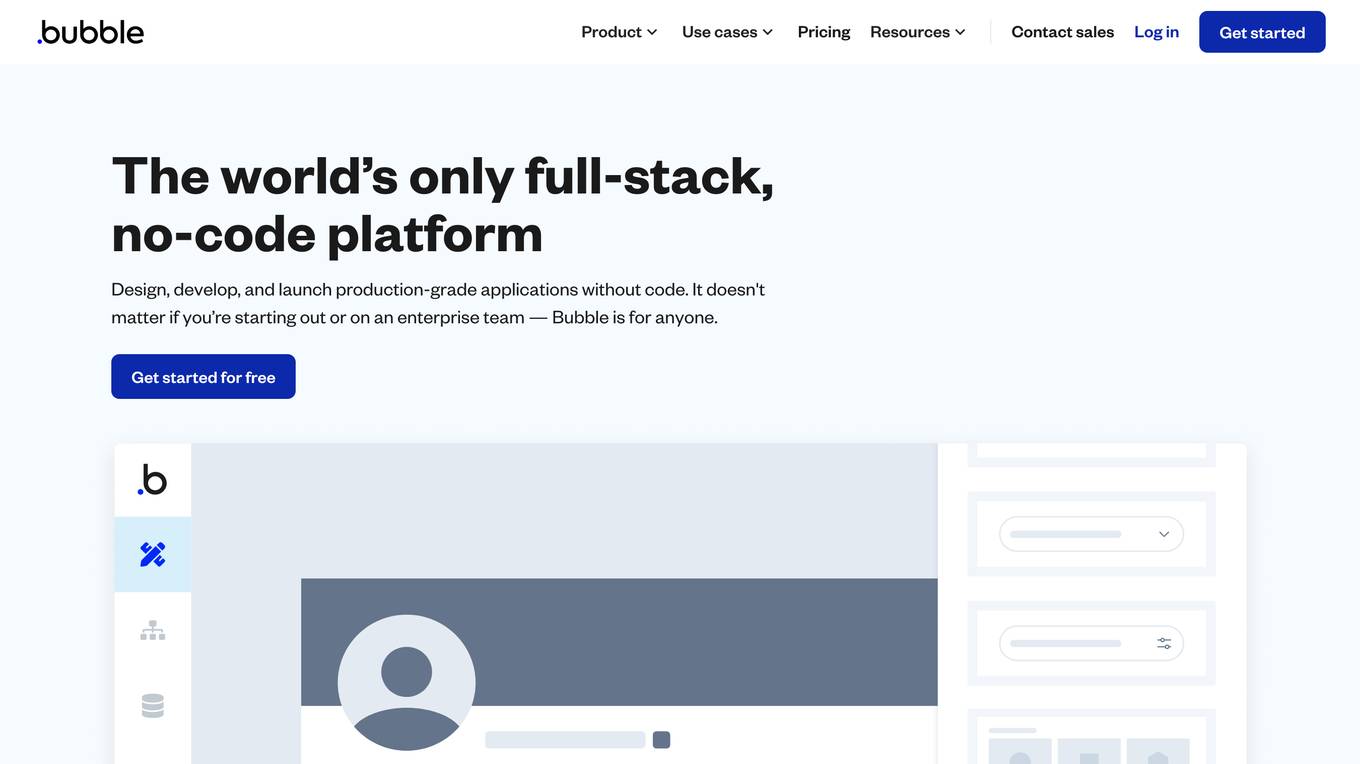
Bubble
Bubble is a no-code application development platform that allows users to build and deploy web and mobile applications without writing any code. It provides a visual interface for designing and developing applications, and it includes a library of pre-built components and templates that can be used to accelerate development. Bubble is suitable for a wide range of users, from beginners with no coding experience to experienced developers who want to build applications quickly and easily.
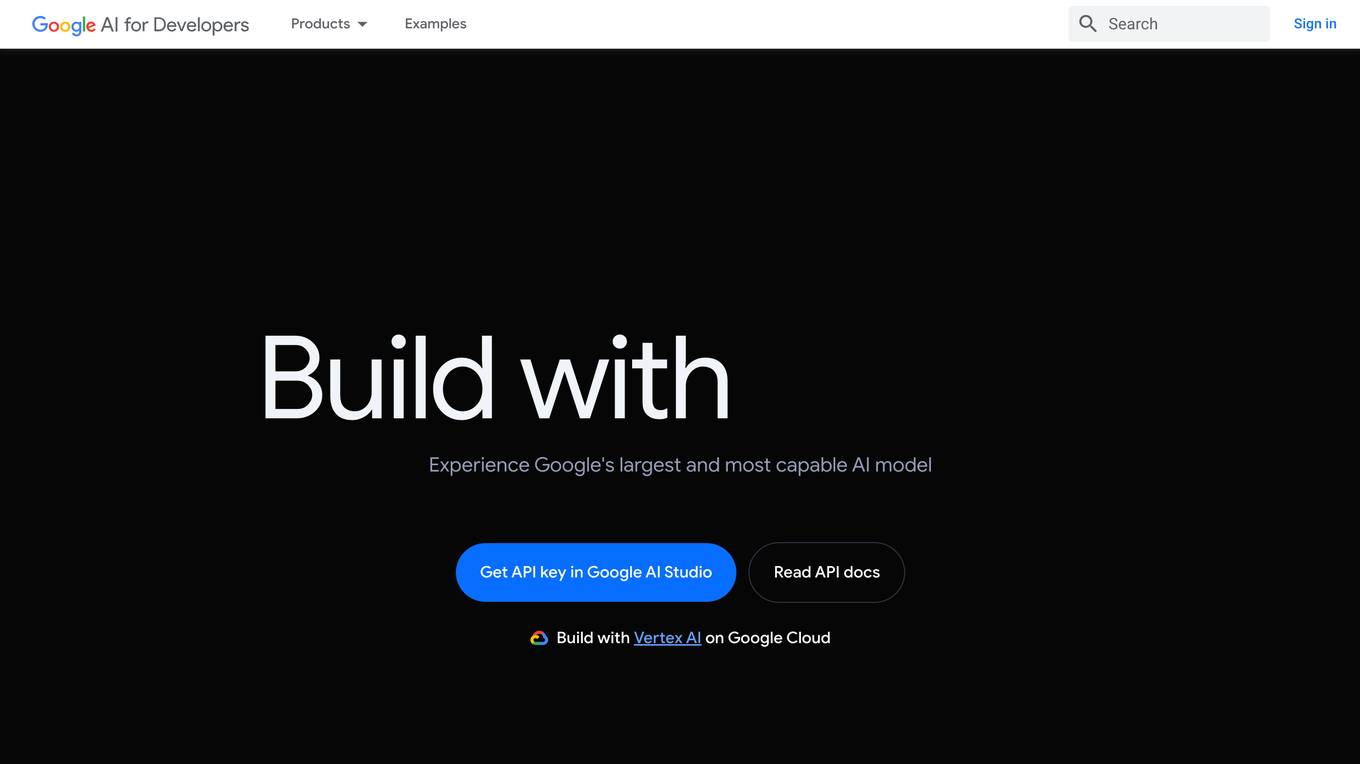
Gemini
Gemini is a large and powerful AI model developed by Google. It is designed to handle a wide variety of text and image reasoning tasks, and it can be used to build a variety of AI-powered applications. Gemini is available in three sizes: Ultra, Pro, and Nano. Ultra is the most capable model, but it is also the most expensive. Pro is the best performing model for a wide variety of tasks, and it is a good value for the price. Nano is the most efficient model, and it is designed for on-device use cases.
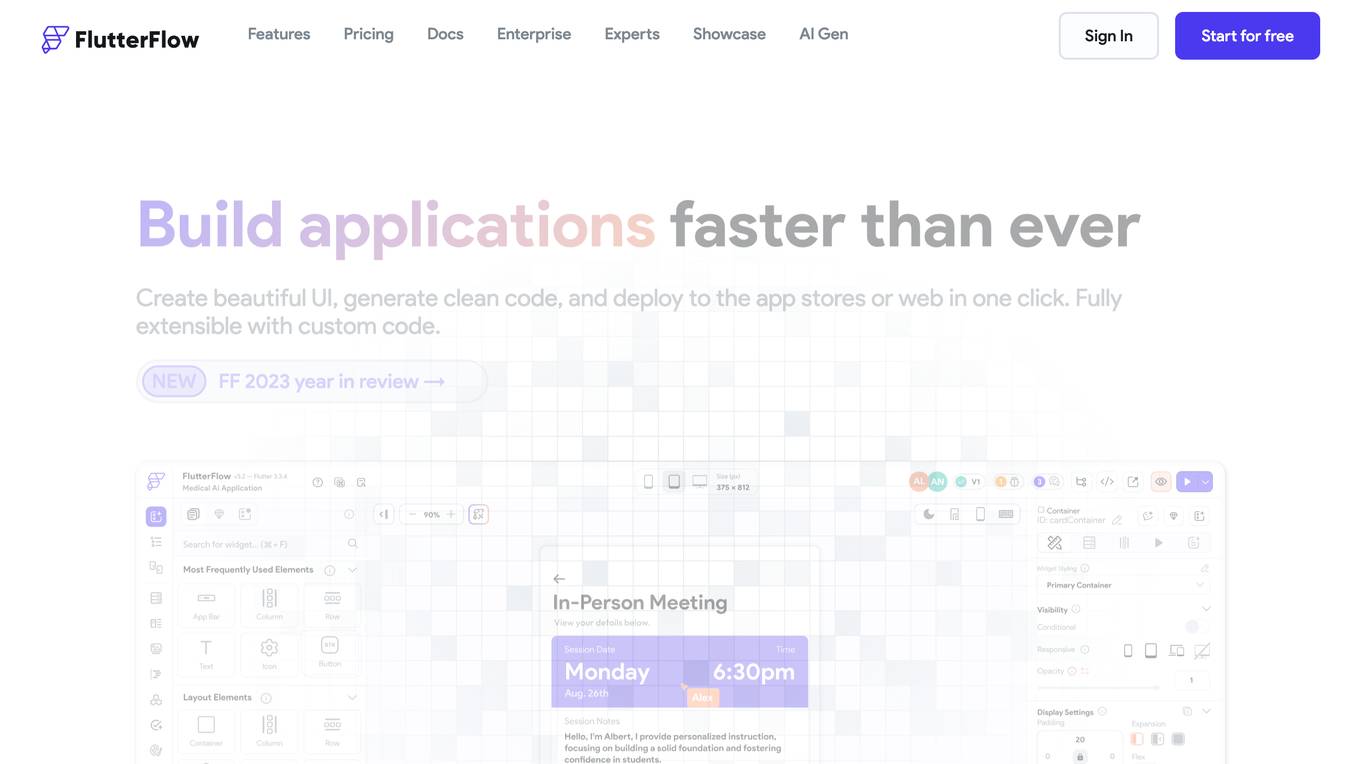
FlutterFlow
FlutterFlow is a low-code development platform that enables users to build cross-platform mobile and web applications without writing code. It provides a visual interface for designing user interfaces, connecting data, and implementing complex logic. FlutterFlow is trusted by users at leading companies around the world and has been used to build a wide range of applications, from simple prototypes to complex enterprise solutions.
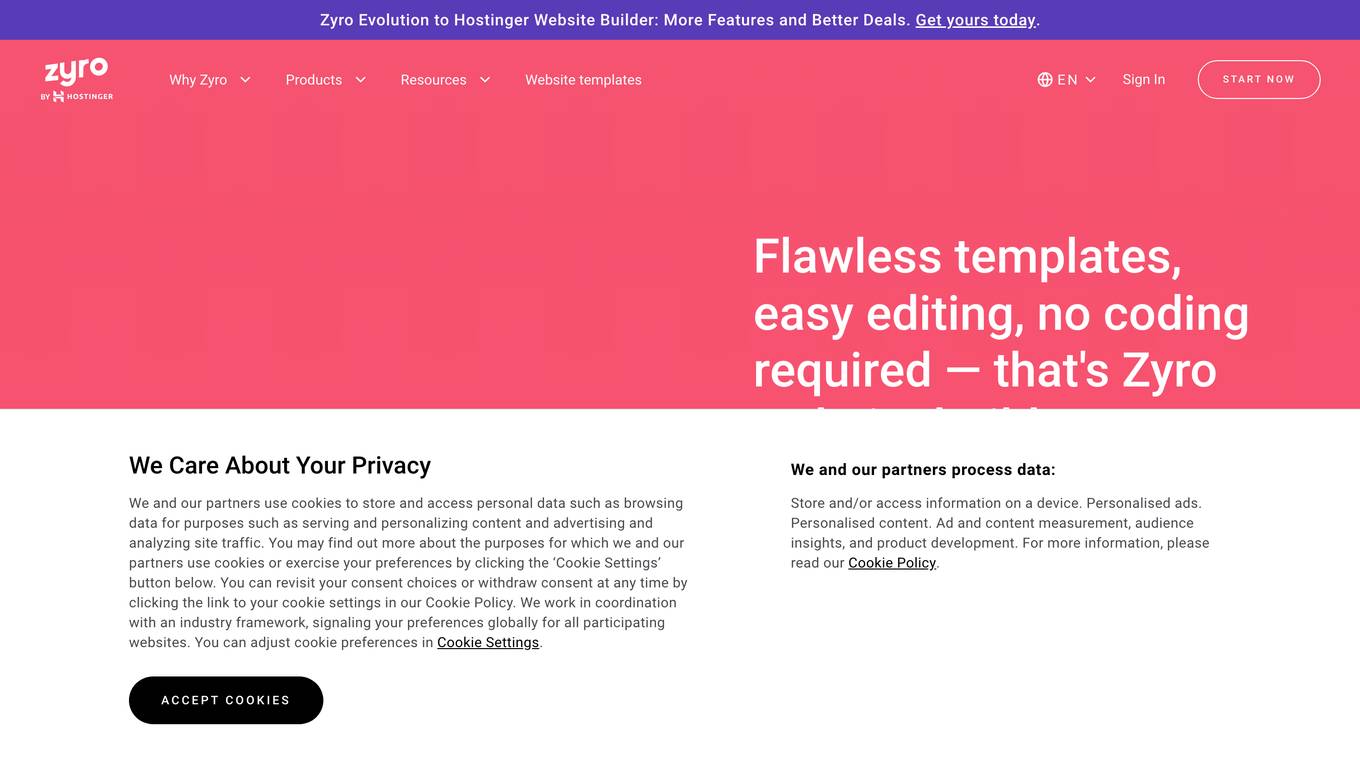
Zyro
Zyro is a website builder that allows users to create professional websites and online stores without any coding knowledge. It offers a range of features, including customizable templates, drag-and-drop editing, and AI-powered tools to help users brand and grow their businesses.
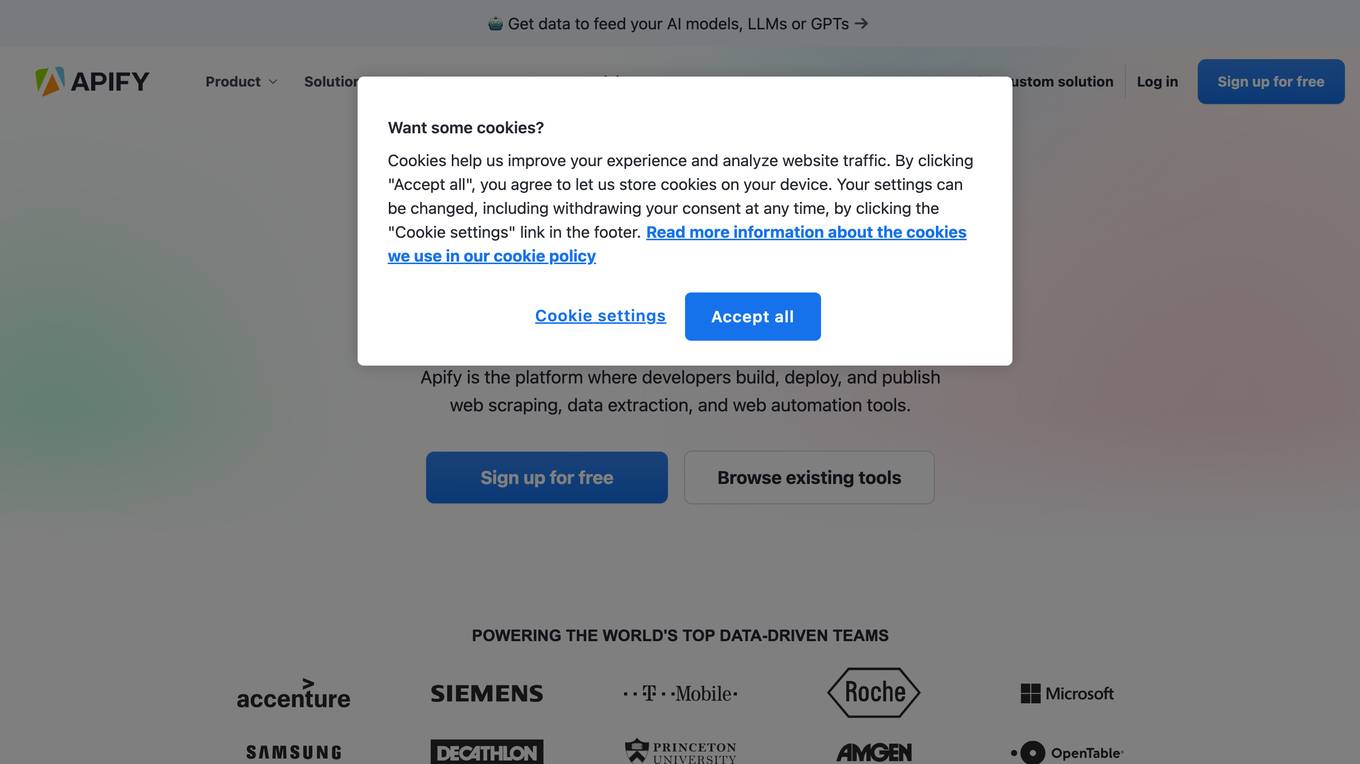
Apify
Apify is a full-stack web scraping and data extraction platform that allows developers to build, deploy, and publish web scraping, data extraction, and web automation tools. It offers a range of features such as ready-made scrapers, open-source web scraping library, code templates, serverless cloud programs, seamless integrations, proxy services, specialized cloud storage, and CLI for local development. Developers can monetize their actors, run Scrapy in the cloud, and use universal web scrapers. Apify is used for various use cases including data for generative AI, product matching AI, and more. The platform simplifies web scraping with open-source tools and supports multiple libraries like Playwright, Puppeteer, Selenium, and Scrapy.
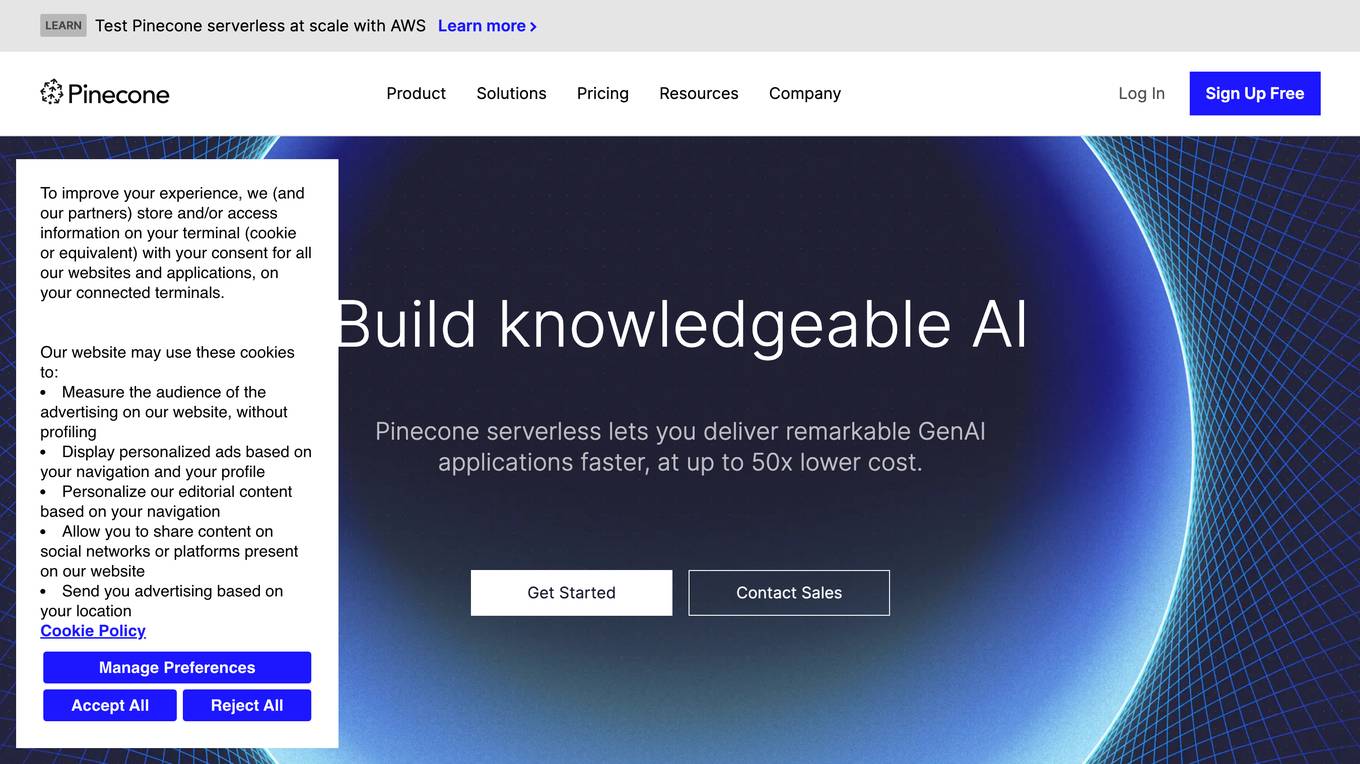
Pinecone
Pinecone is a vector database that helps power AI for the world's best companies. It is a serverless database that lets you deliver remarkable GenAI applications faster, at up to 50x lower cost. Pinecone is easy to use and can be integrated with your favorite cloud provider, data sources, models, frameworks, and more.

Cursor
Cursor is an AI-first code editor that helps developers build software faster. It provides a variety of features to help developers, including code completion, code generation, and error detection. Cursor is also designed to be easy to use and integrates with popular development tools like VSCode.
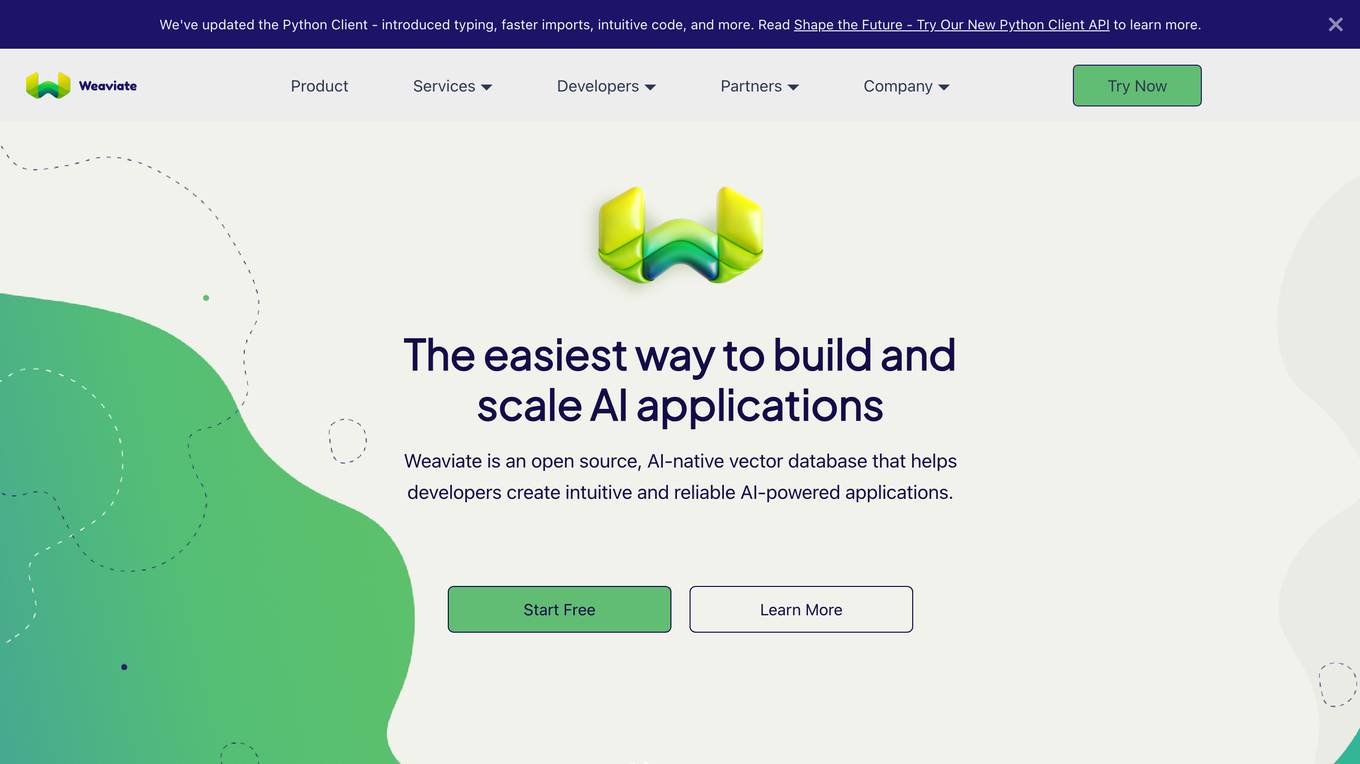
Weaviate
Weaviate is an AI-native database that empowers developers to build intuitive applications with less hallucination, data leakage, and vendor lock-in. It offers features like Hybrid Search, RAG for generative AI applications, Generative Feedback Loops, pluggable ML models, and secure, flexible deployment options. Weaviate is open source, cost-efficient at scale, and provides lightning-fast pure vector similarity search capabilities. With over 1M monthly downloads, Weaviate is a core piece of the AI-native stack for developers and enterprises, offering unparalleled flexibility and support on their AI journey.
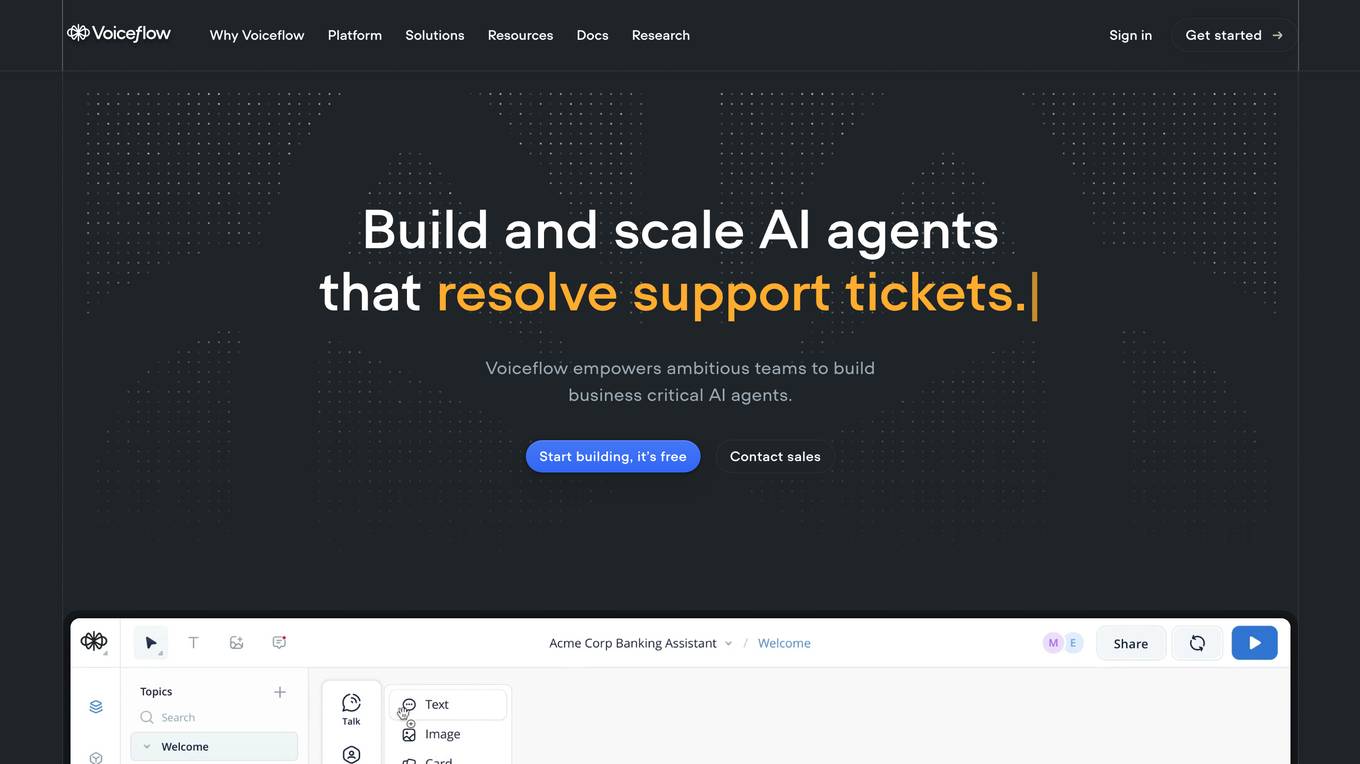
Voiceflow
Voiceflow is a powerful, flexible, and collaborative platform for building AI automation. It allows teams of any size to build agents of any scale and complexity, easily. Voiceflow's visual workflow builder is used by developers and designers to collaboratively create, iterate, and ship complex agents. Voiceflow also offers a central CMS for managing all of your agent content, including variables, intents, entities, and knowledge base sources. With Voiceflow, you can integrate with any API or service, share and test prototypes, and launch agents to any interface.
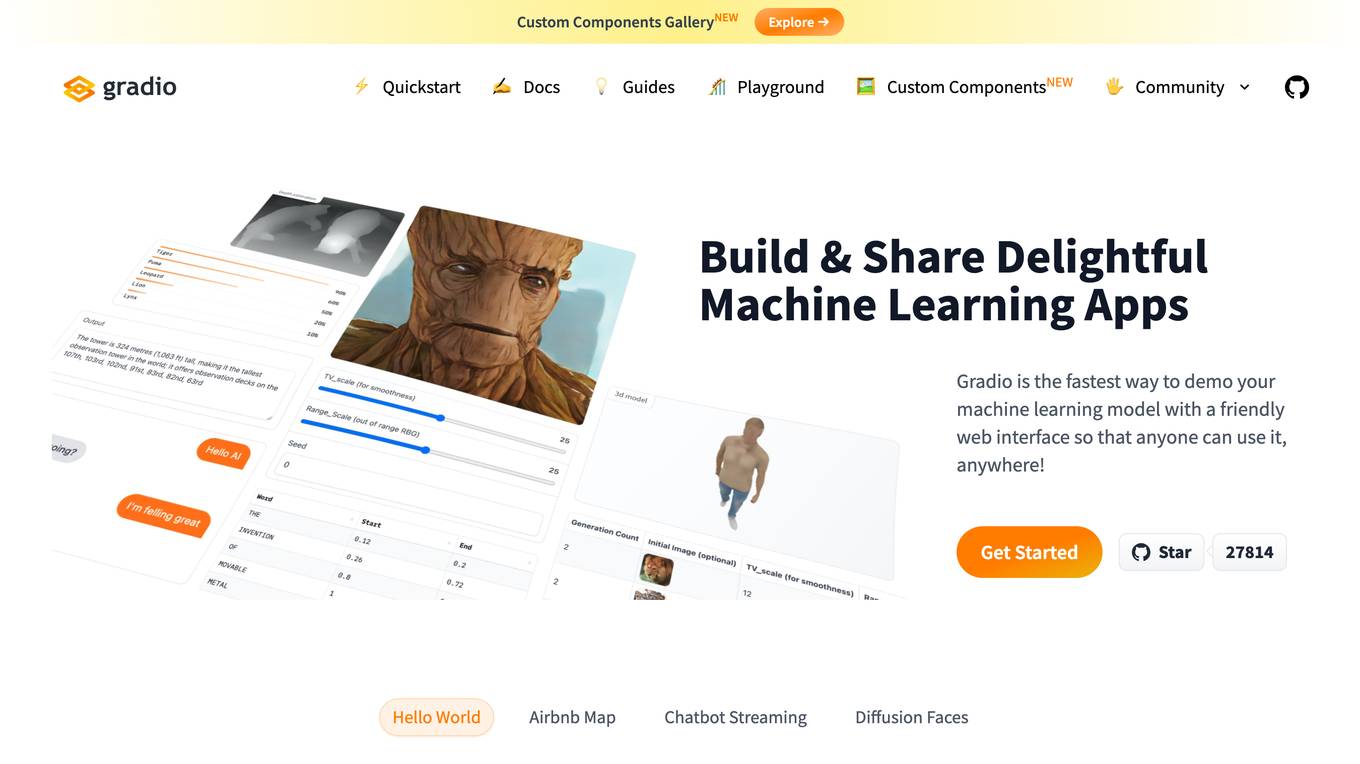
Gradio
Gradio is a tool that allows users to quickly and easily create web-based interfaces for their machine learning models. With Gradio, users can share their models with others, allowing them to interact with and use the models remotely. Gradio is easy to use and can be integrated with any Python library. It can be used to create a variety of different types of interfaces, including those for image classification, natural language processing, and time series analysis.
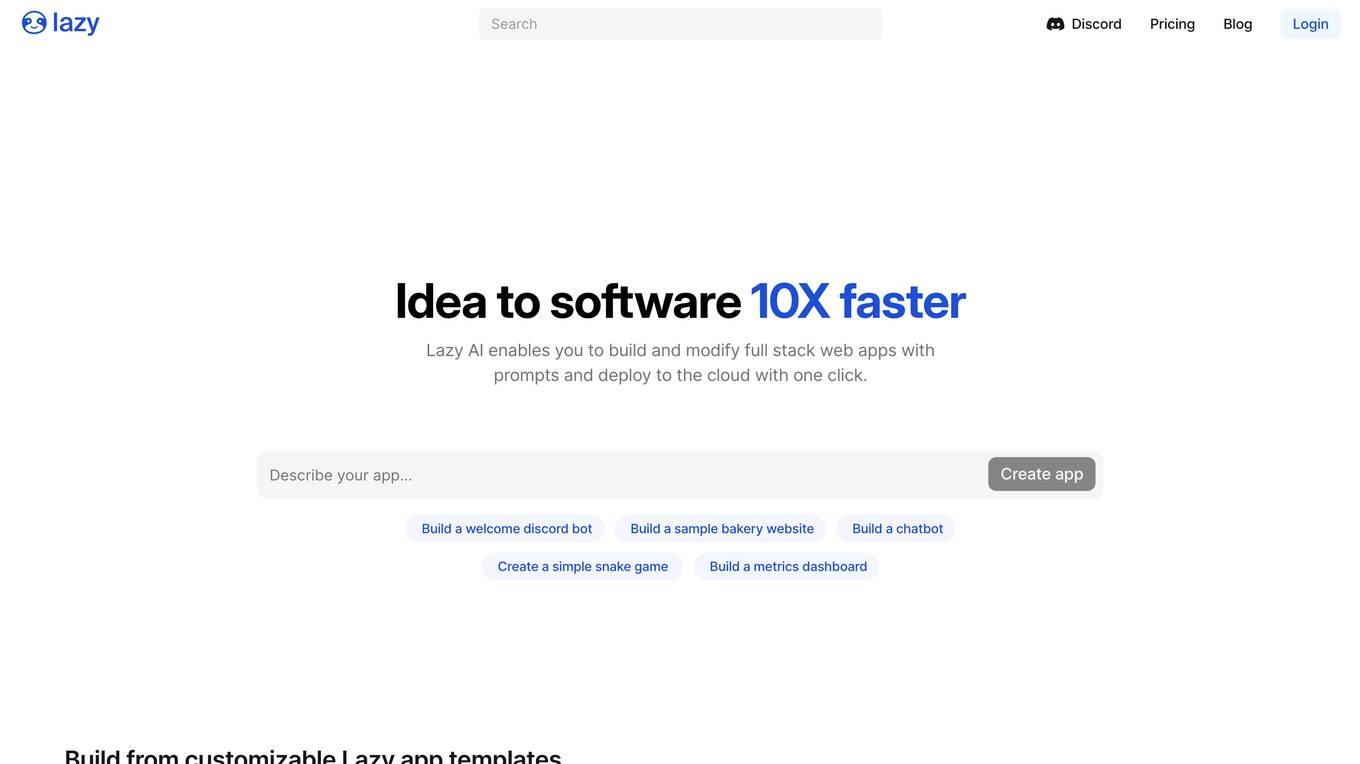
Lazy AI
Lazy AI is a platform that allows users to create full stack web applications with prompts and deploy them to the cloud with just one click. Users can build and modify web apps, AI agents, automations, chatbots, and more using AI technology. The platform offers a variety of tools and templates to streamline the app development process, making it easy and fun for users to bring their ideas to life.
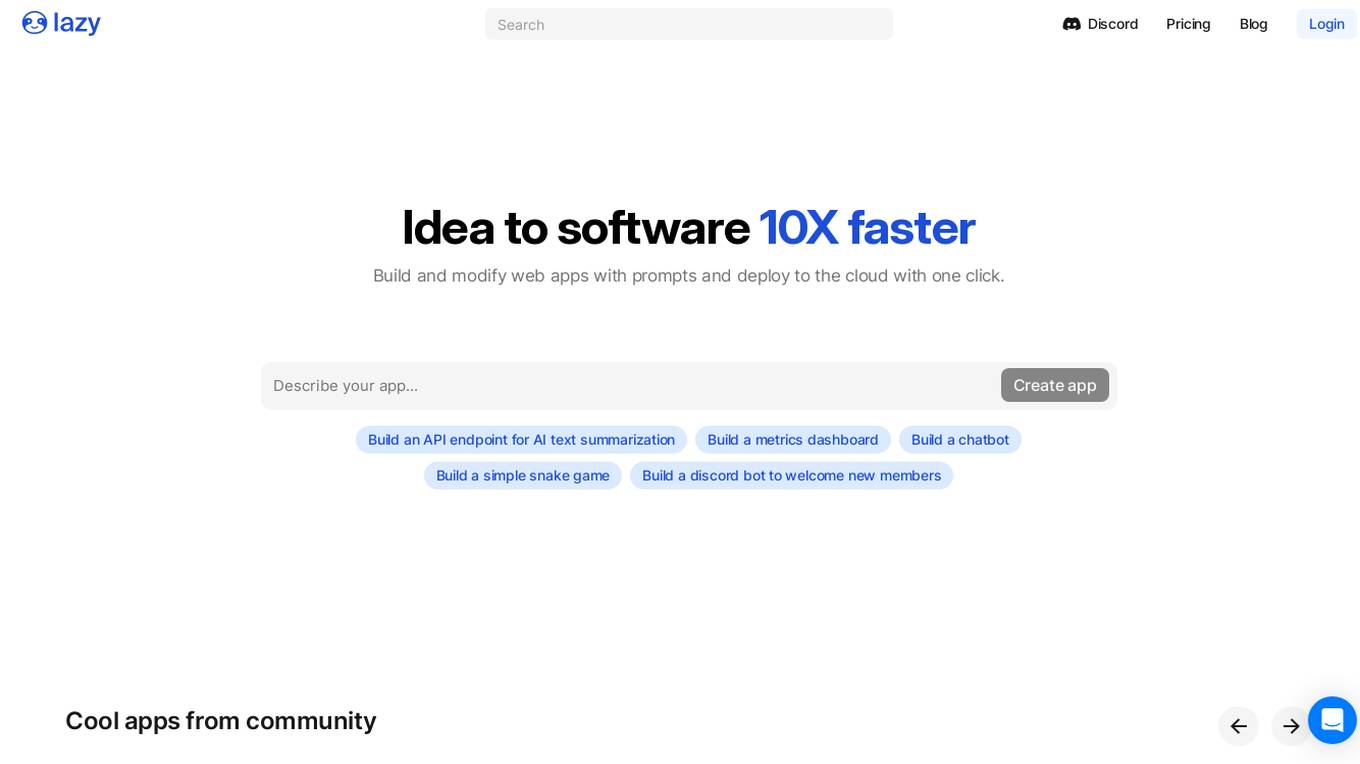
Lazy AI
Lazy AI is a platform that enables users to build full stack web applications 10 times faster by utilizing AI technology. Users can create and modify web apps with prompts and deploy them to the cloud with just one click. The platform offers a variety of features including AI Component Builder, eCommerce store creation, Crypto Arbitrage Scraper, Text to Speech Converter, Lazy Image to Video generation, PDF Chatbot, and more. Lazy AI aims to streamline the app development process and empower users to leverage AI for various tasks.

GuidedTrack
GuidedTrack is a powerful survey and web app builder that allows users to create highly interactive digital experiences such as web apps, educational modules, advanced surveys, prototypes, and more. It offers unmatched speed, flexibility, and affordability compared to other builders. Users can embed their creations anywhere without programming skills, integrate with various tools and services through an API, and receive expert hands-on support for guidance. GuidedTrack provides comprehensive templates for data collection, marketing insights, educational content delivery, and more.
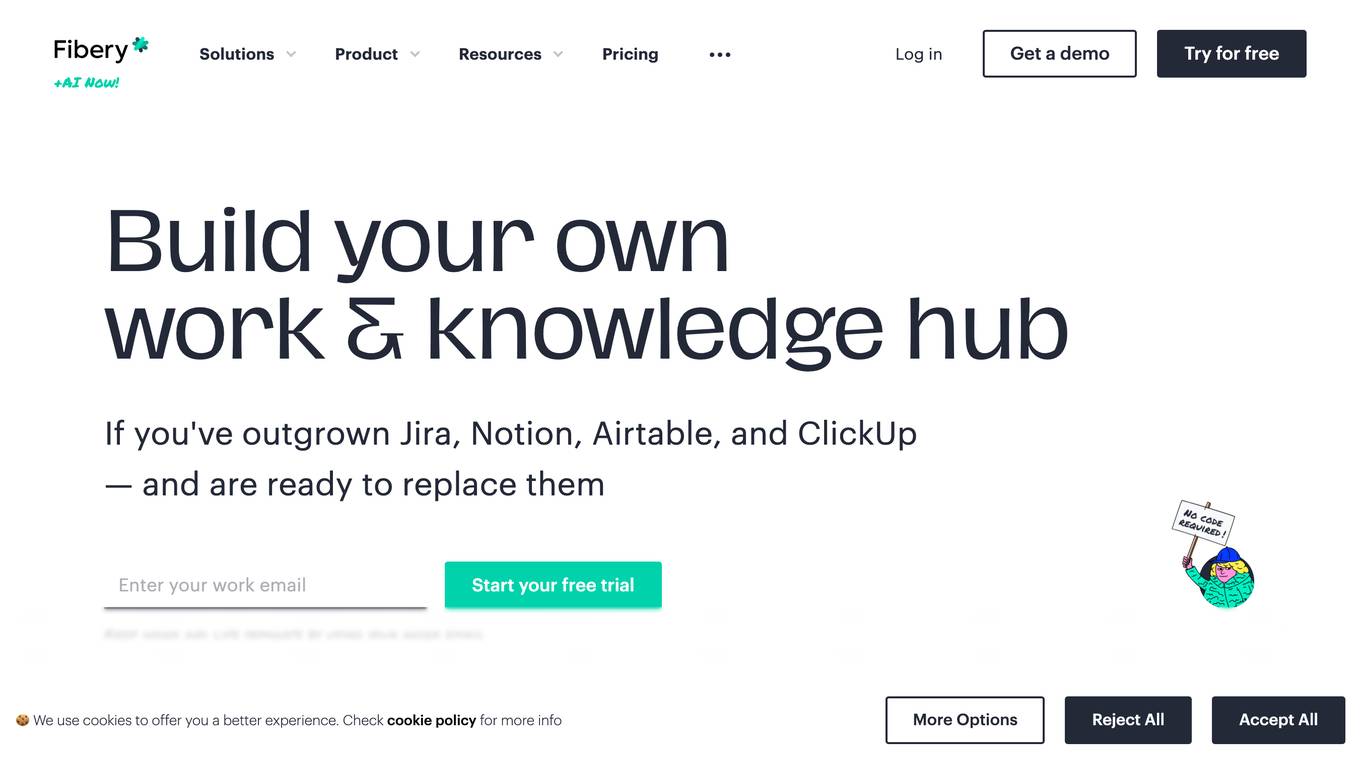
Fibery
Fibery is a no-code work and knowledge management hub that connects structured data (e.g. tables, kanban boards) with unstructured data (e.g. documents) to provide a single source of truth for teams. It offers a range of features including custom fields, databases, and relations, as well as powerful reporting and analytics capabilities. Fibery is designed to be flexible and customizable, allowing teams to map their processes and workflows in a way that suits them best.
20 - Open Source AI Tools
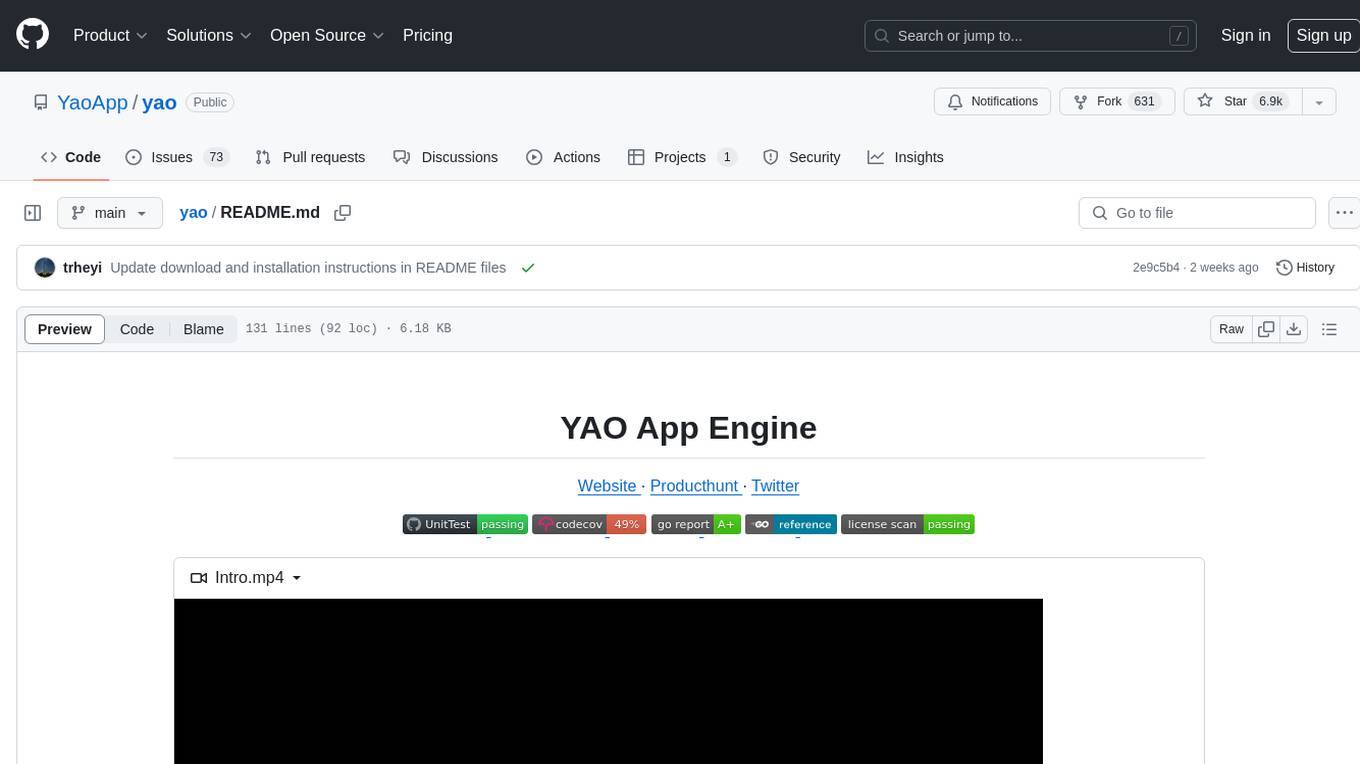
yao
YAO is an open-source application engine written in Golang, suitable for developing business systems, website/APP API, admin panel, and self-built low-code platforms. It adopts a flow-based programming model to implement functions by writing YAO DSL or using JavaScript. Yao allows developers to create web services by processes, creating a database model, writing API services, and describing dashboard interfaces just by JSON for web & hardware, and 10x productivity. It is based on the flow-based programming idea, developed in Go language, and supports multiple ways to expand the data stream processor. Yao has a built-in data management system, making it suitable for quickly making various management backgrounds, CRM, ERP, and other internal enterprise systems. It is highly versatile, efficient, and performs better than PHP, JAVA, and other languages.
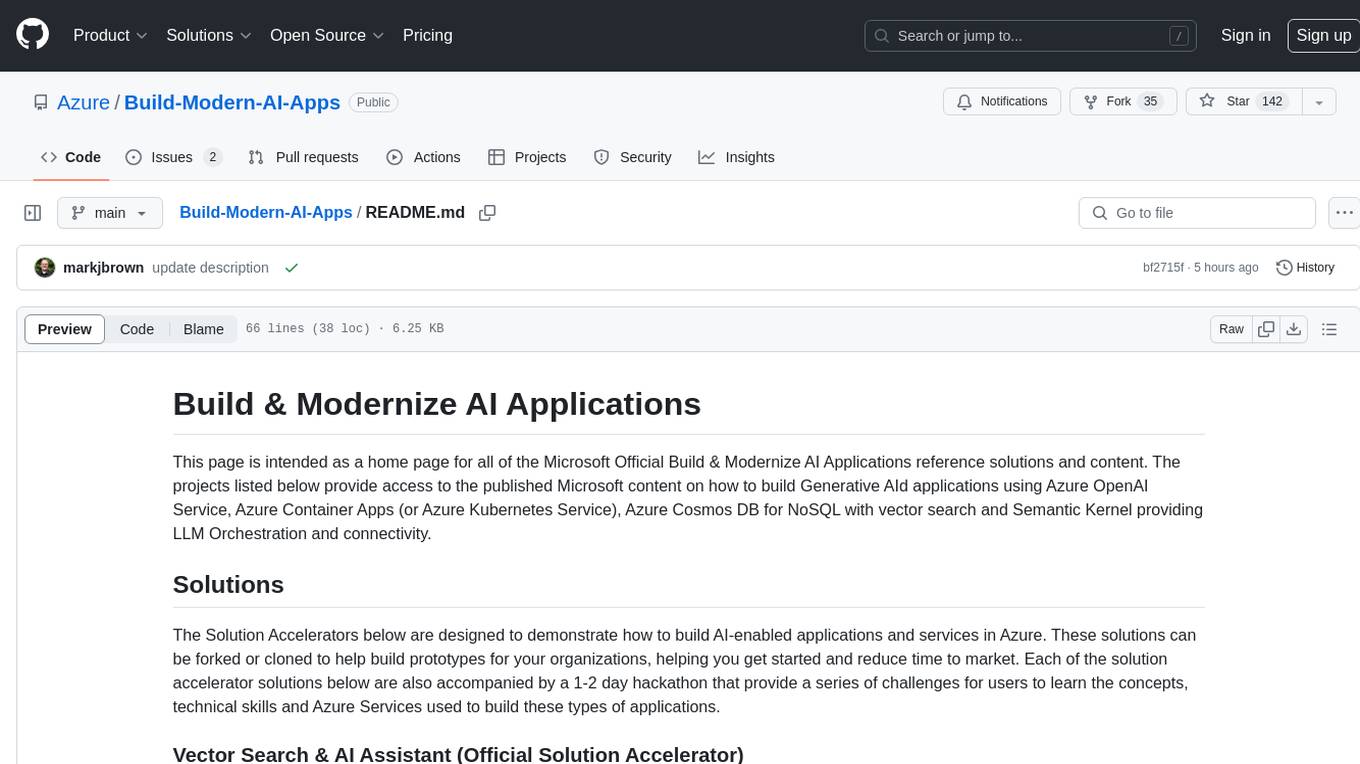
Build-Modern-AI-Apps
This repository serves as a hub for Microsoft Official Build & Modernize AI Applications reference solutions and content. It provides access to projects demonstrating how to build Generative AI applications using Azure services like Azure OpenAI, Azure Container Apps, Azure Kubernetes, and Azure Cosmos DB. The solutions include Vector Search & AI Assistant, Real-Time Payment and Transaction Processing, and Medical Claims Processing. Additionally, there are workshops like the Intelligent App Workshop for Microsoft Copilot Stack, focusing on infusing intelligence into traditional software systems using foundation models and design thinking.
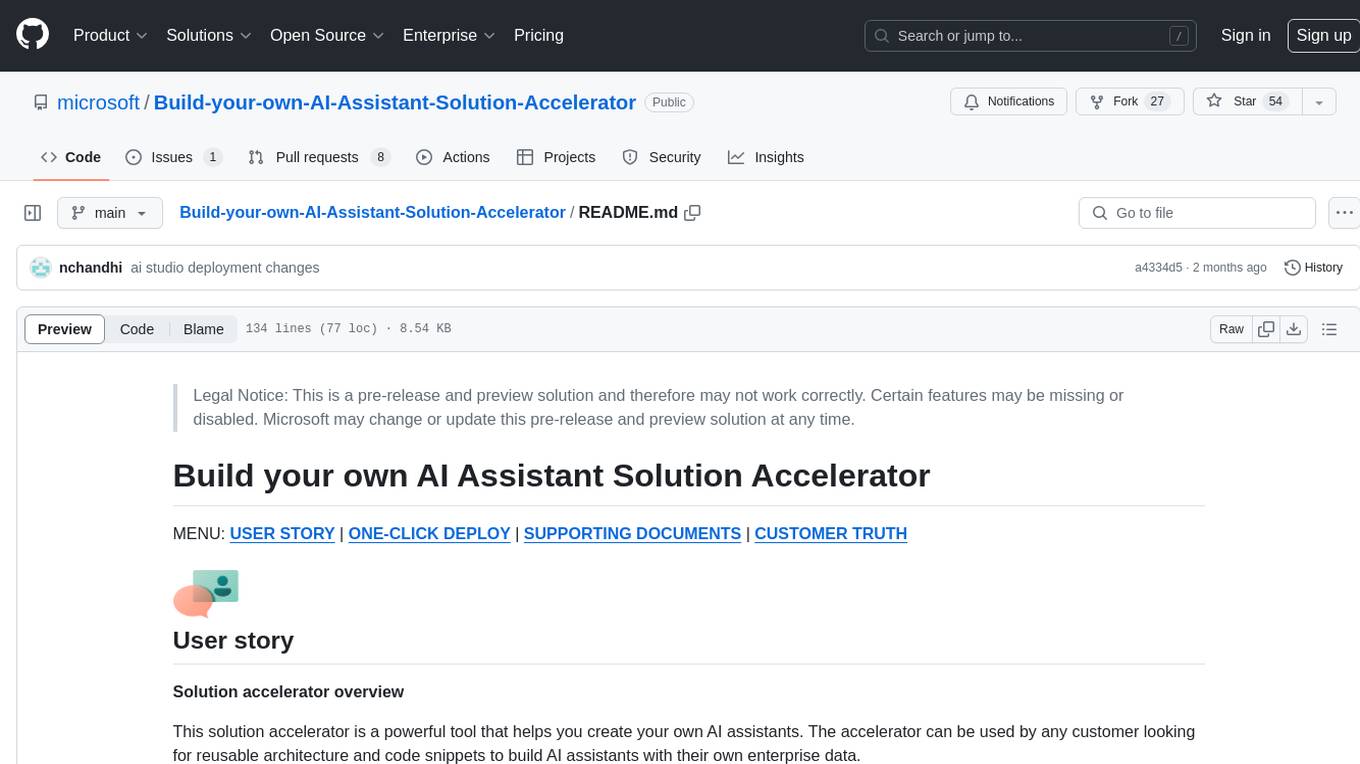
Build-your-own-AI-Assistant-Solution-Accelerator
Build-your-own-AI-Assistant-Solution-Accelerator is a pre-release and preview solution that helps users create their own AI assistants. It leverages Azure Open AI Service, Azure AI Search, and Microsoft Fabric to identify, summarize, and categorize unstructured information. Users can easily find relevant articles and grants, generate grant applications, and export them as PDF or Word documents. The solution accelerator provides reusable architecture and code snippets for building AI assistants with enterprise data. It is designed for researchers looking to explore flu vaccine studies and grants to accelerate grant proposal submissions.

agentcloud
AgentCloud is an open-source platform that enables companies to build and deploy private LLM chat apps, empowering teams to securely interact with their data. It comprises three main components: Agent Backend, Webapp, and Vector Proxy. To run this project locally, clone the repository, install Docker, and start the services. The project is licensed under the GNU Affero General Public License, version 3 only. Contributions and feedback are welcome from the community.

sorrentum
Sorrentum is an open-source project that aims to combine open-source development, startups, and brilliant students to build machine learning, AI, and Web3 / DeFi protocols geared towards finance and economics. The project provides opportunities for internships, research assistantships, and development grants, as well as the chance to work on cutting-edge problems, learn about startups, write academic papers, and get internships and full-time positions at companies working on Sorrentum applications.
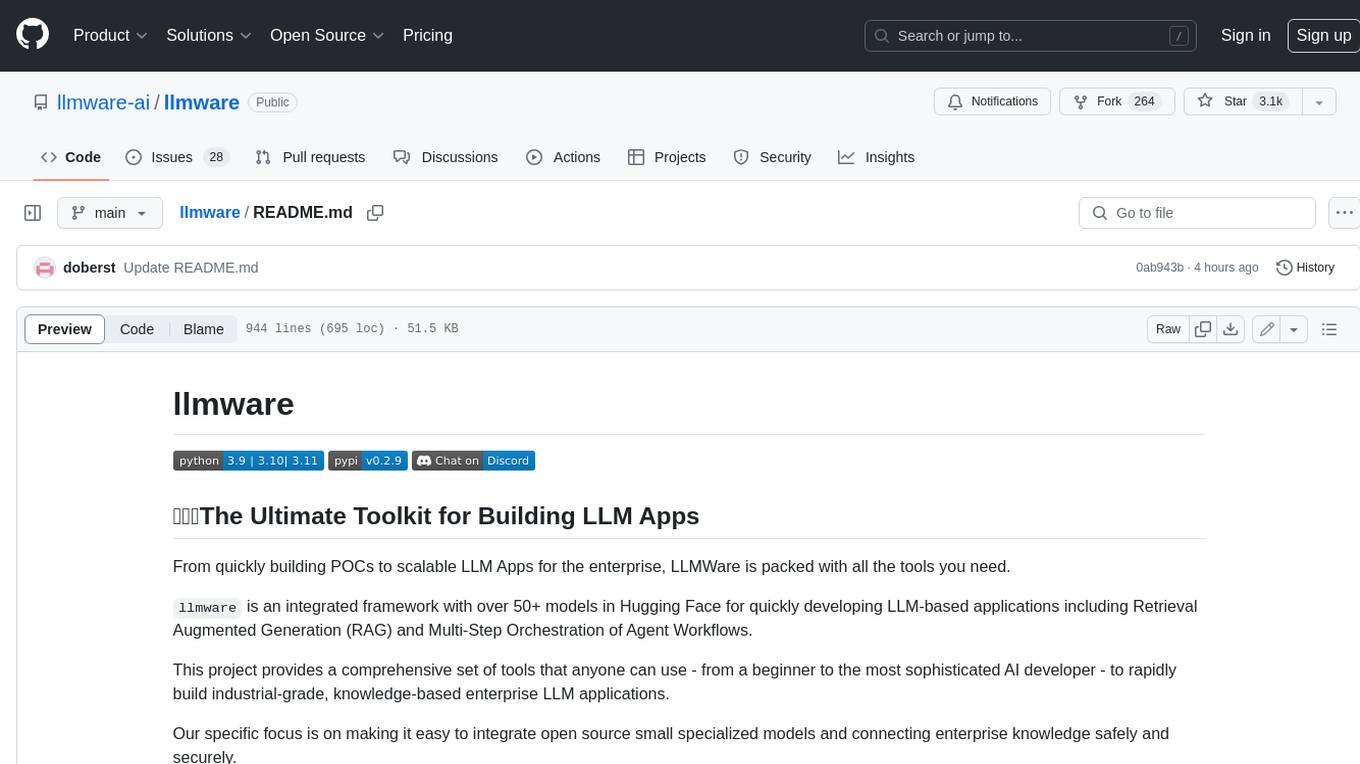
llmware
LLMWare is a framework for quickly developing LLM-based applications including Retrieval Augmented Generation (RAG) and Multi-Step Orchestration of Agent Workflows. This project provides a comprehensive set of tools that anyone can use - from a beginner to the most sophisticated AI developer - to rapidly build industrial-grade, knowledge-based enterprise LLM applications. Our specific focus is on making it easy to integrate open source small specialized models and connecting enterprise knowledge safely and securely.

airbyte
Airbyte is an open-source data integration platform that makes it easy to move data from any source to any destination. With Airbyte, you can build and manage data pipelines without writing any code. Airbyte provides a library of pre-built connectors that make it easy to connect to popular data sources and destinations. You can also create your own connectors using Airbyte's no-code Connector Builder or low-code CDK. Airbyte is used by data engineers and analysts at companies of all sizes to build and manage their data pipelines.

zep-python
Zep is an open-source platform for building and deploying large language model (LLM) applications. It provides a suite of tools and services that make it easy to integrate LLMs into your applications, including chat history memory, embedding, vector search, and data enrichment. Zep is designed to be scalable, reliable, and easy to use, making it a great choice for developers who want to build LLM-powered applications quickly and easily.
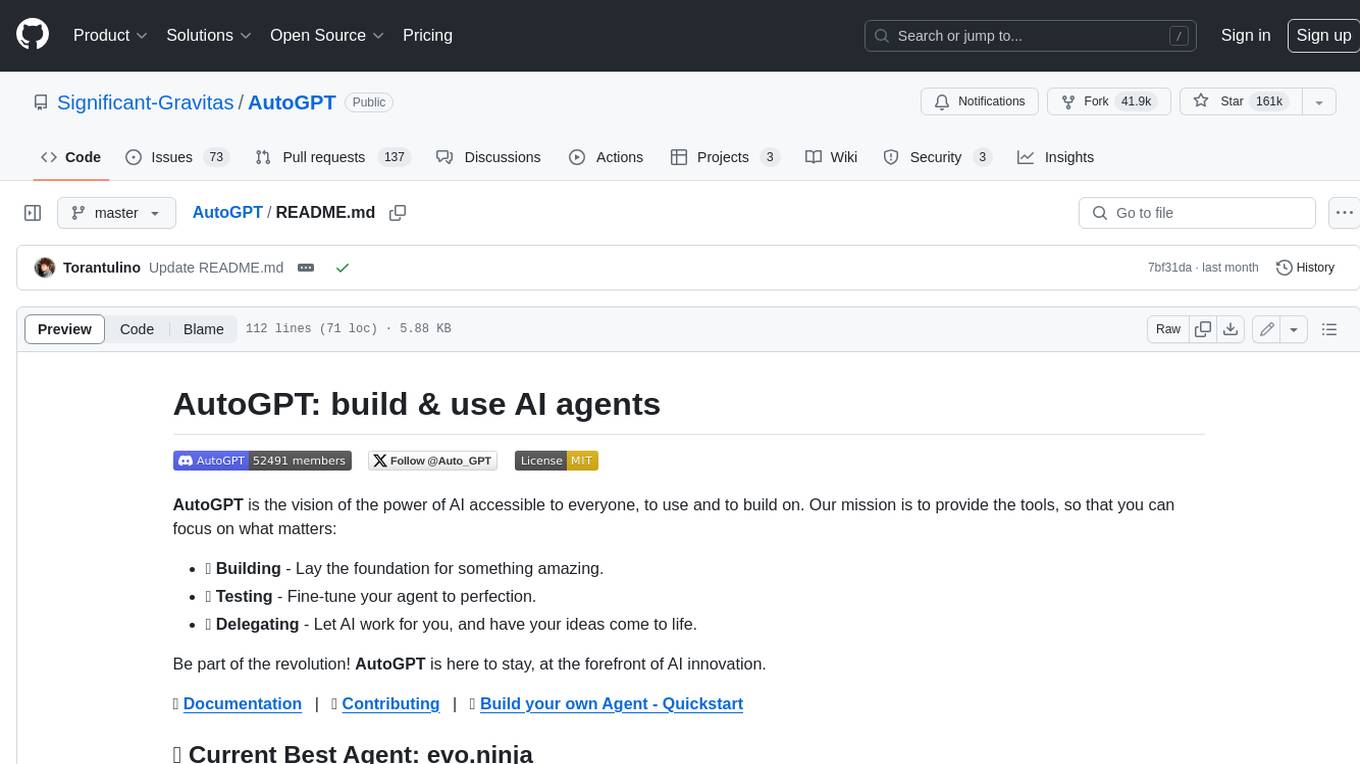
AutoGPT
AutoGPT is a revolutionary tool that empowers everyone to harness the power of AI. With AutoGPT, you can effortlessly build, test, and delegate tasks to AI agents, unlocking a world of possibilities. Our mission is to provide the tools you need to focus on what truly matters: innovation and creativity.

Flowise
Flowise is a tool that allows users to build customized LLM flows with a drag-and-drop UI. It is open-source and self-hostable, and it supports various deployments, including AWS, Azure, Digital Ocean, GCP, Railway, Render, HuggingFace Spaces, Elestio, Sealos, and RepoCloud. Flowise has three different modules in a single mono repository: server, ui, and components. The server module is a Node backend that serves API logics, the ui module is a React frontend, and the components module contains third-party node integrations. Flowise supports different environment variables to configure your instance, and you can specify these variables in the .env file inside the packages/server folder.
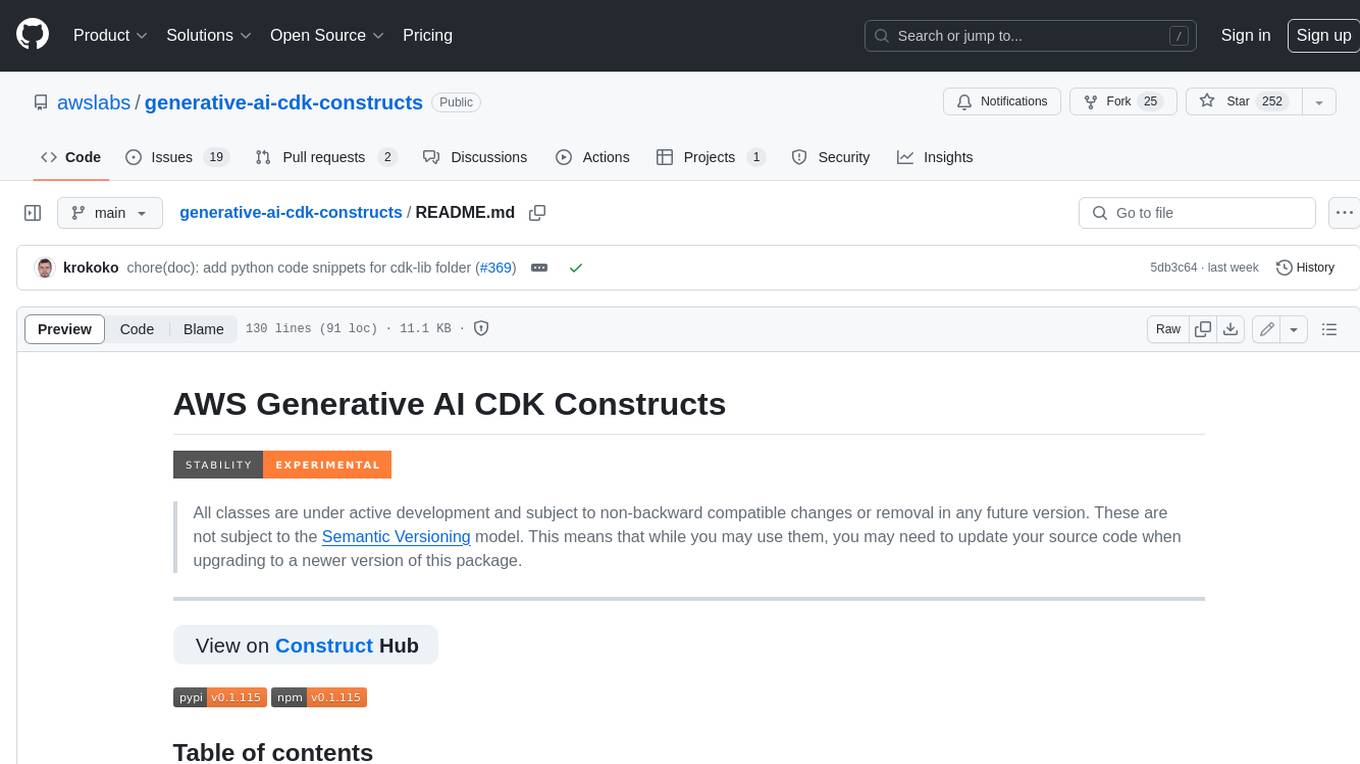
generative-ai-cdk-constructs
The AWS Generative AI Constructs Library is an open-source extension of the AWS Cloud Development Kit (AWS CDK) that provides multi-service, well-architected patterns for quickly defining solutions in code to create predictable and repeatable infrastructure, called constructs. The goal of AWS Generative AI CDK Constructs is to help developers build generative AI solutions using pattern-based definitions for their architecture. The patterns defined in AWS Generative AI CDK Constructs are high level, multi-service abstractions of AWS CDK constructs that have default configurations based on well-architected best practices. The library is organized into logical modules using object-oriented techniques to create each architectural pattern model.
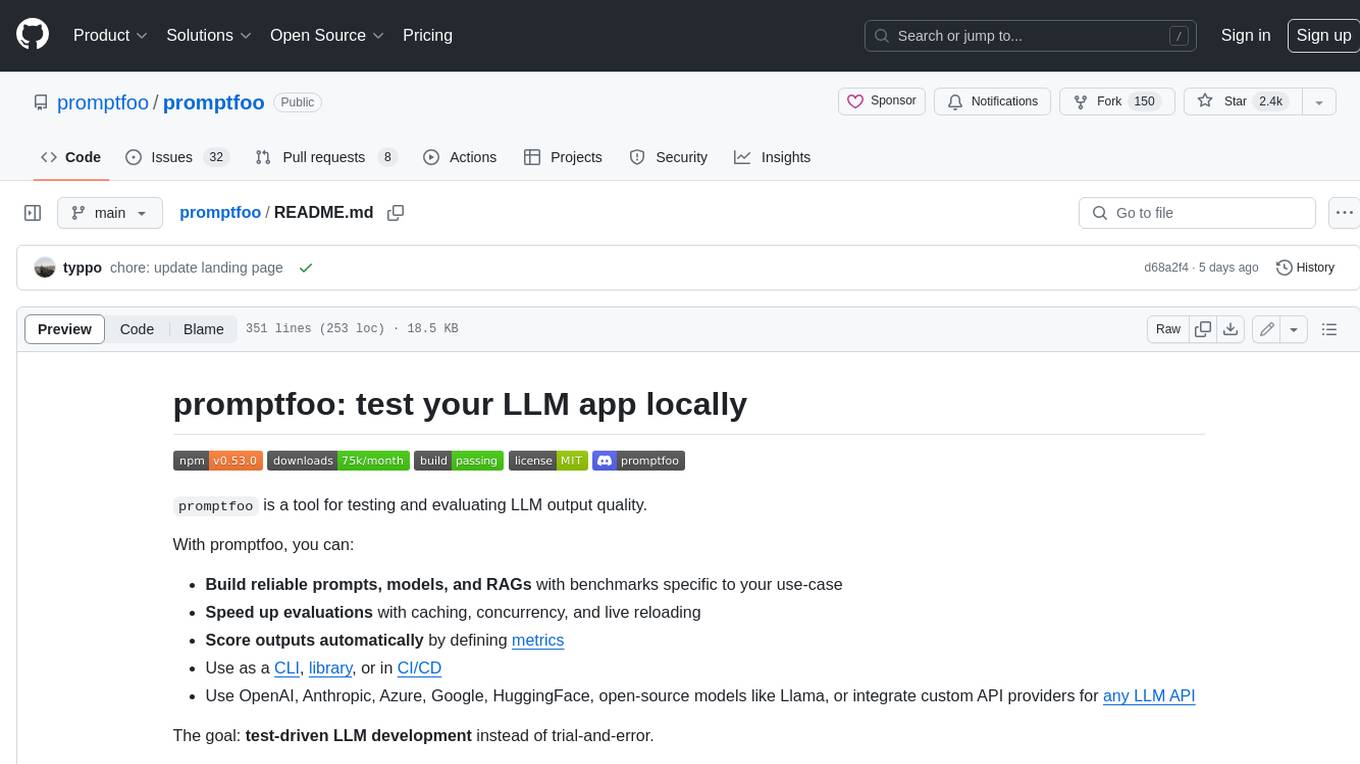
promptfoo
Promptfoo is a tool for testing and evaluating LLM output quality. With promptfoo, you can build reliable prompts, models, and RAGs with benchmarks specific to your use-case, speed up evaluations with caching, concurrency, and live reloading, score outputs automatically by defining metrics, use as a CLI, library, or in CI/CD, and use OpenAI, Anthropic, Azure, Google, HuggingFace, open-source models like Llama, or integrate custom API providers for any LLM API.

dify
Dify is an open-source LLM app development platform that combines AI workflow, RAG pipeline, agent capabilities, model management, observability features, and more. It allows users to quickly go from prototype to production. Key features include: 1. Workflow: Build and test powerful AI workflows on a visual canvas. 2. Comprehensive model support: Seamless integration with hundreds of proprietary / open-source LLMs from dozens of inference providers and self-hosted solutions. 3. Prompt IDE: Intuitive interface for crafting prompts, comparing model performance, and adding additional features. 4. RAG Pipeline: Extensive RAG capabilities that cover everything from document ingestion to retrieval. 5. Agent capabilities: Define agents based on LLM Function Calling or ReAct, and add pre-built or custom tools. 6. LLMOps: Monitor and analyze application logs and performance over time. 7. Backend-as-a-Service: All of Dify's offerings come with corresponding APIs for easy integration into your own business logic.
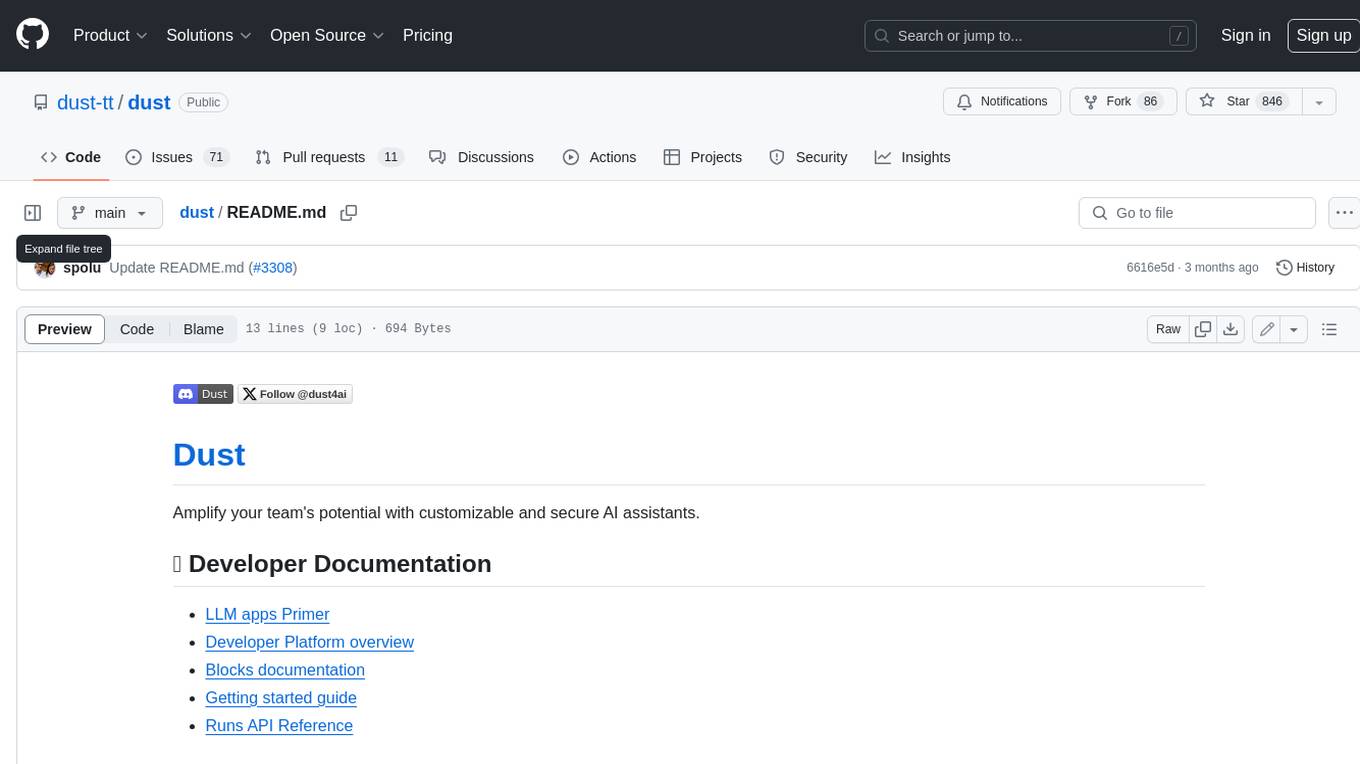
dust
Dust is a platform that provides customizable and secure AI assistants to amplify your team's potential. With Dust, you can build and deploy AI assistants that are tailored to your specific needs, without the need for extensive technical expertise. Dust's platform is easy to use and provides a variety of features to help you get started quickly, including a library of pre-built blocks, a developer platform, and an API reference.

resonance
Resonance is a framework designed to facilitate interoperability and messaging between services in your infrastructure and beyond. It provides AI capabilities and takes full advantage of asynchronous PHP, built on top of Swoole. With Resonance, you can: * Chat with Open-Source LLMs: Create prompt controllers to directly answer user's prompts. LLM takes care of determining user's intention, so you can focus on taking appropriate action. * Asynchronous Where it Matters: Respond asynchronously to incoming RPC or WebSocket messages (or both combined) with little overhead. You can set up all the asynchronous features using attributes. No elaborate configuration is needed. * Simple Things Remain Simple: Writing HTTP controllers is similar to how it's done in the synchronous code. Controllers have new exciting features that take advantage of the asynchronous environment. * Consistency is Key: You can keep the same approach to writing software no matter the size of your project. There are no growing central configuration files or service dependencies registries. Every relation between code modules is local to those modules. * Promises in PHP: Resonance provides a partial implementation of Promise/A+ spec to handle various asynchronous tasks. * GraphQL Out of the Box: You can build elaborate GraphQL schemas by using just the PHP attributes. Resonance takes care of reusing SQL queries and optimizing the resources' usage. All fields can be resolved asynchronously.

chainlit
Chainlit is an open-source async Python framework which allows developers to build scalable Conversational AI or agentic applications. It enables users to create ChatGPT-like applications, embedded chatbots, custom frontends, and API endpoints. The framework provides features such as multi-modal chats, chain of thought visualization, data persistence, human feedback, and an in-context prompt playground. Chainlit is compatible with various Python programs and libraries, including LangChain, Llama Index, Autogen, OpenAI Assistant, and Haystack. It offers a range of examples and a cookbook to showcase its capabilities and inspire users. Chainlit welcomes contributions and is licensed under the Apache 2.0 license.
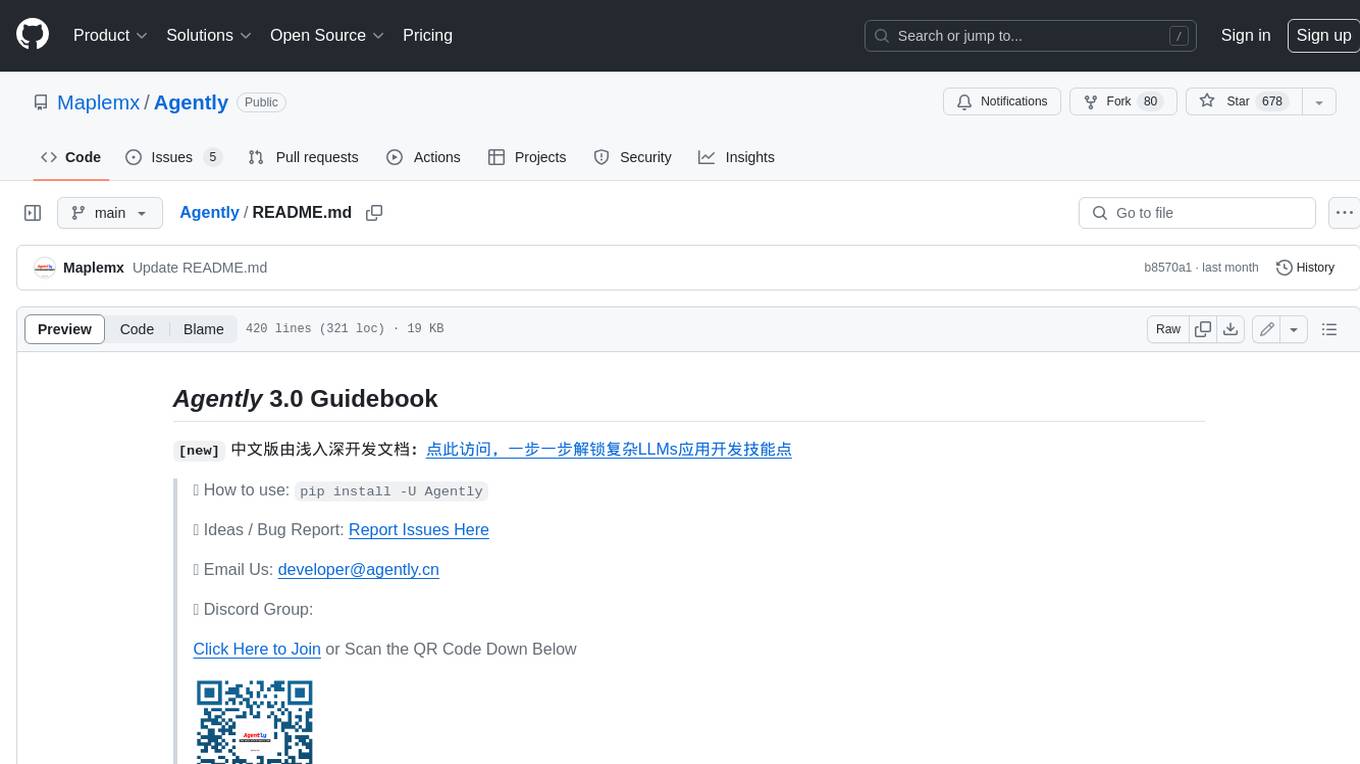
Agently
Agently is a development framework that helps developers build AI agent native application really fast. You can use and build AI agent in your code in an extremely simple way. You can create an AI agent instance then interact with it like calling a function in very few codes like this below. Click the run button below and witness the magic. It's just that simple: python # Import and Init Settings import Agently agent = Agently.create_agent() agent\ .set_settings("current_model", "OpenAI")\ .set_settings("model.OpenAI.auth", {"api_key": ""}) # Interact with the agent instance like calling a function result = agent\ .input("Give me 3 words")\ .output([("String", "one word")])\ .start() print(result) ['apple', 'banana', 'carrot'] And you may notice that when we print the value of `result`, the value is a `list` just like the format of parameter we put into the `.output()`. In Agently framework we've done a lot of work like this to make it easier for application developers to integrate Agent instances into their business code. This will allow application developers to focus on how to build their business logic instead of figure out how to cater to language models or how to keep models satisfied.
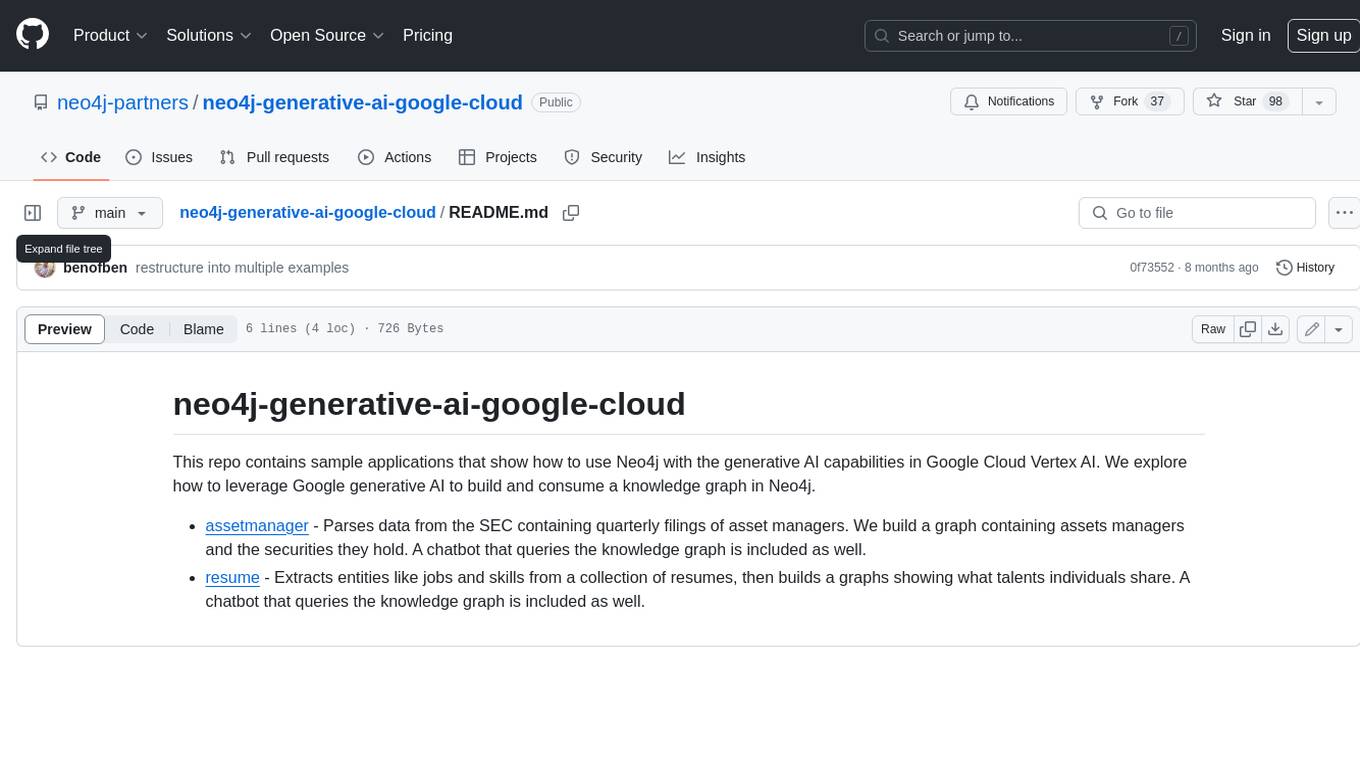
neo4j-generative-ai-google-cloud
This repo contains sample applications that show how to use Neo4j with the generative AI capabilities in Google Cloud Vertex AI. We explore how to leverage Google generative AI to build and consume a knowledge graph in Neo4j.
20 - OpenAI Gpts
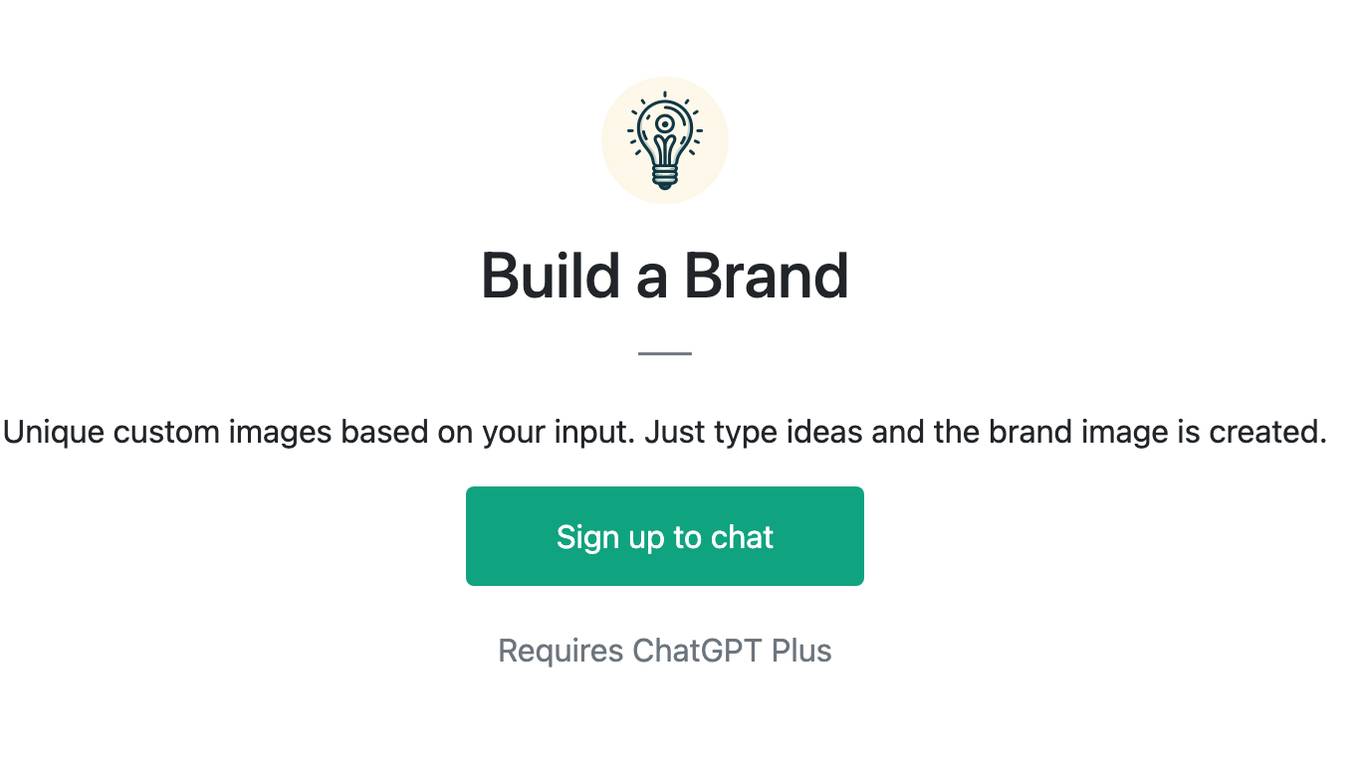
Build a Brand
Unique custom images based on your input. Just type ideas and the brand image is created.
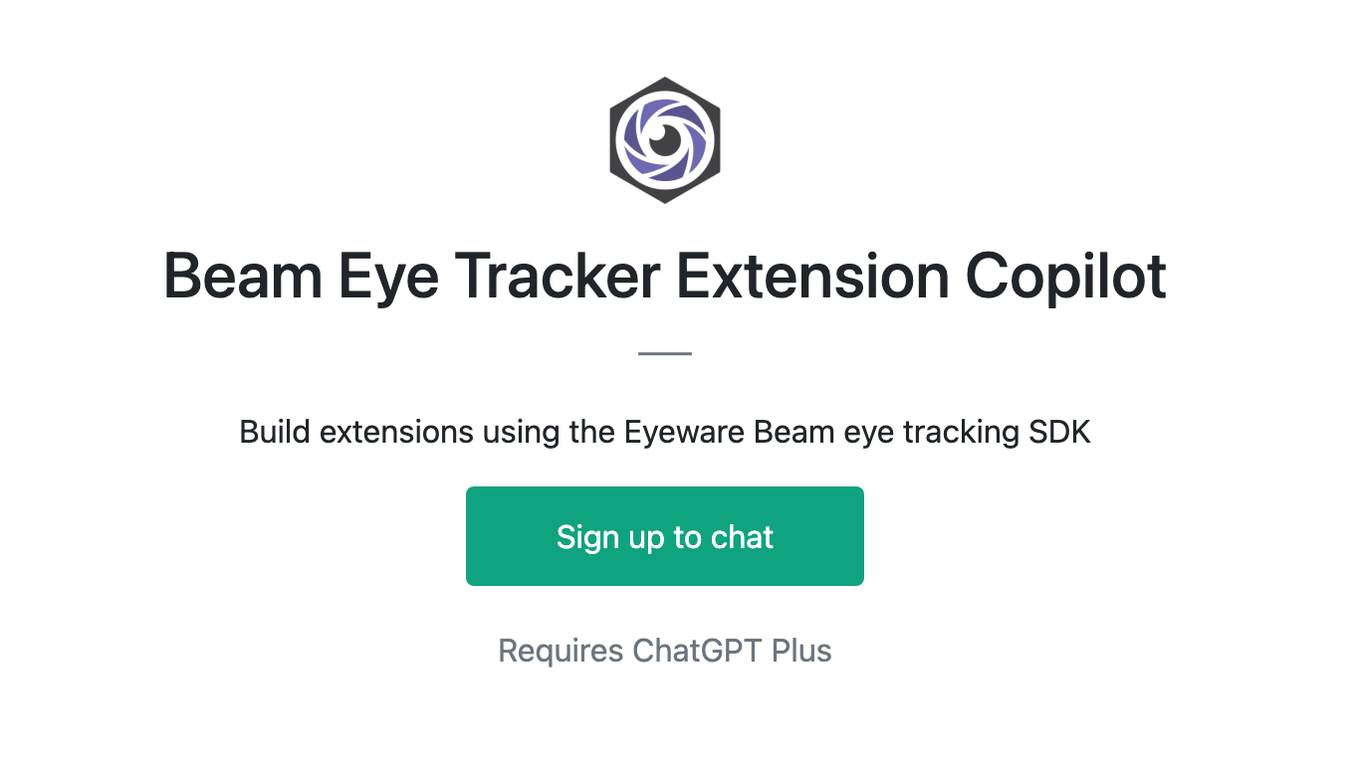
Beam Eye Tracker Extension Copilot
Build extensions using the Eyeware Beam eye tracking SDK

Business Model Canvas Strategist
Business Model Canvas Creator - Build and evaluate your business model

League Champion Builder GPT
Build your own League of Legends Style Champion with Abilities, Back Story and Splash Art
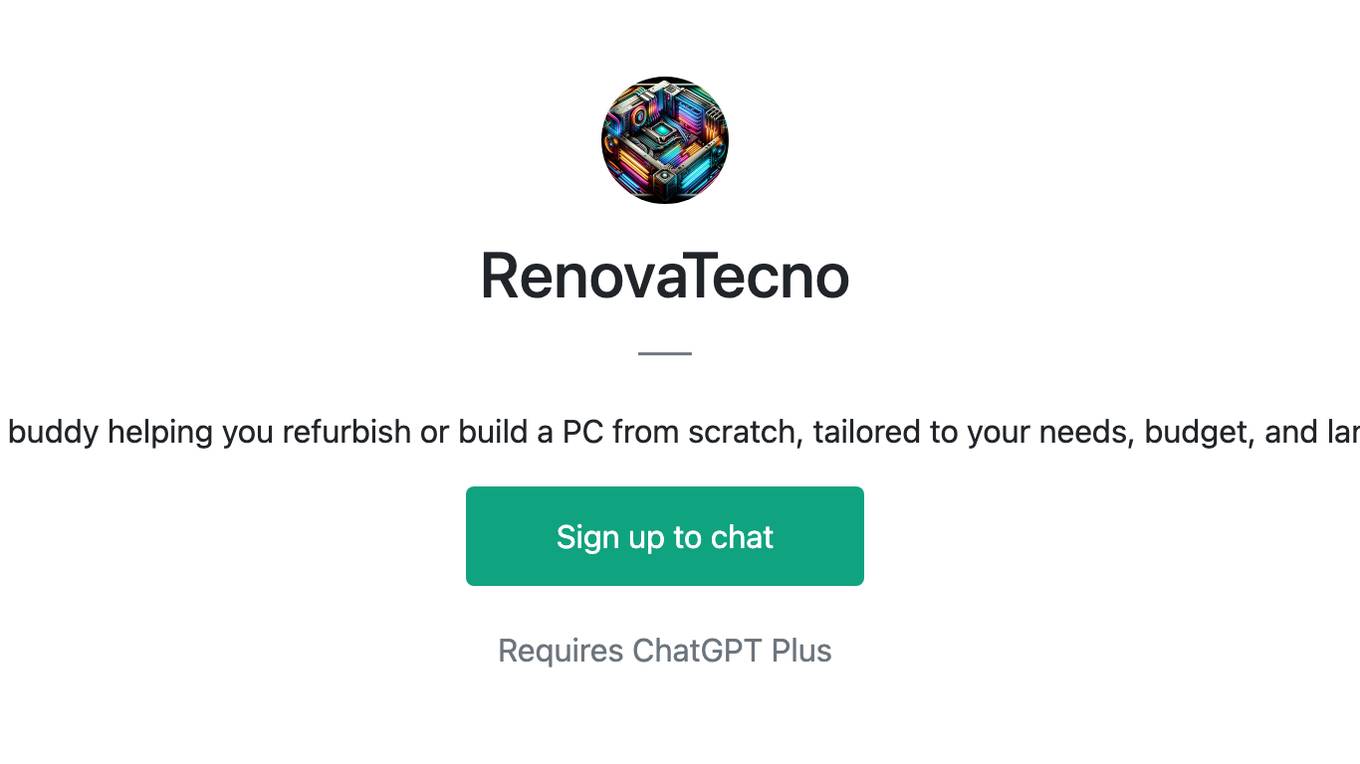
RenovaTecno
Your tech buddy helping you refurbish or build a PC from scratch, tailored to your needs, budget, and language.
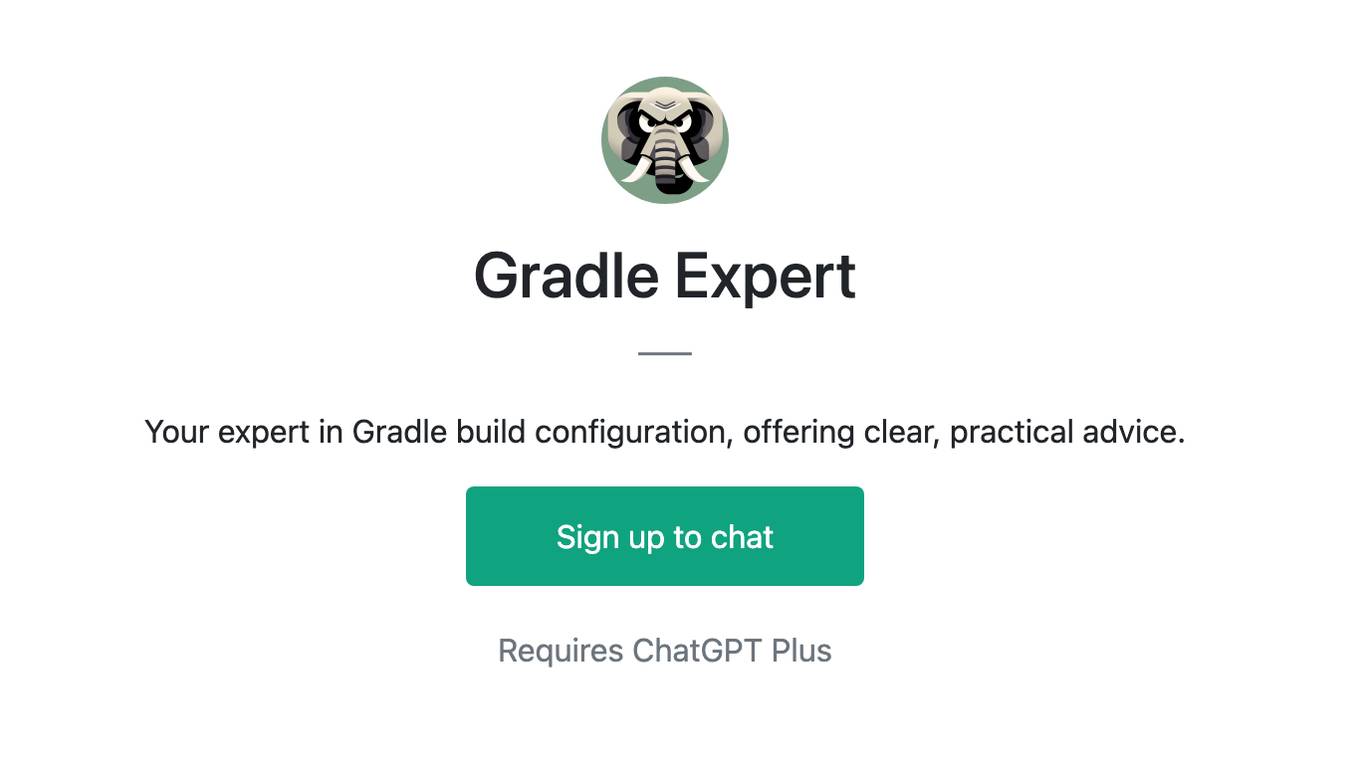
Gradle Expert
Your expert in Gradle build configuration, offering clear, practical advice.
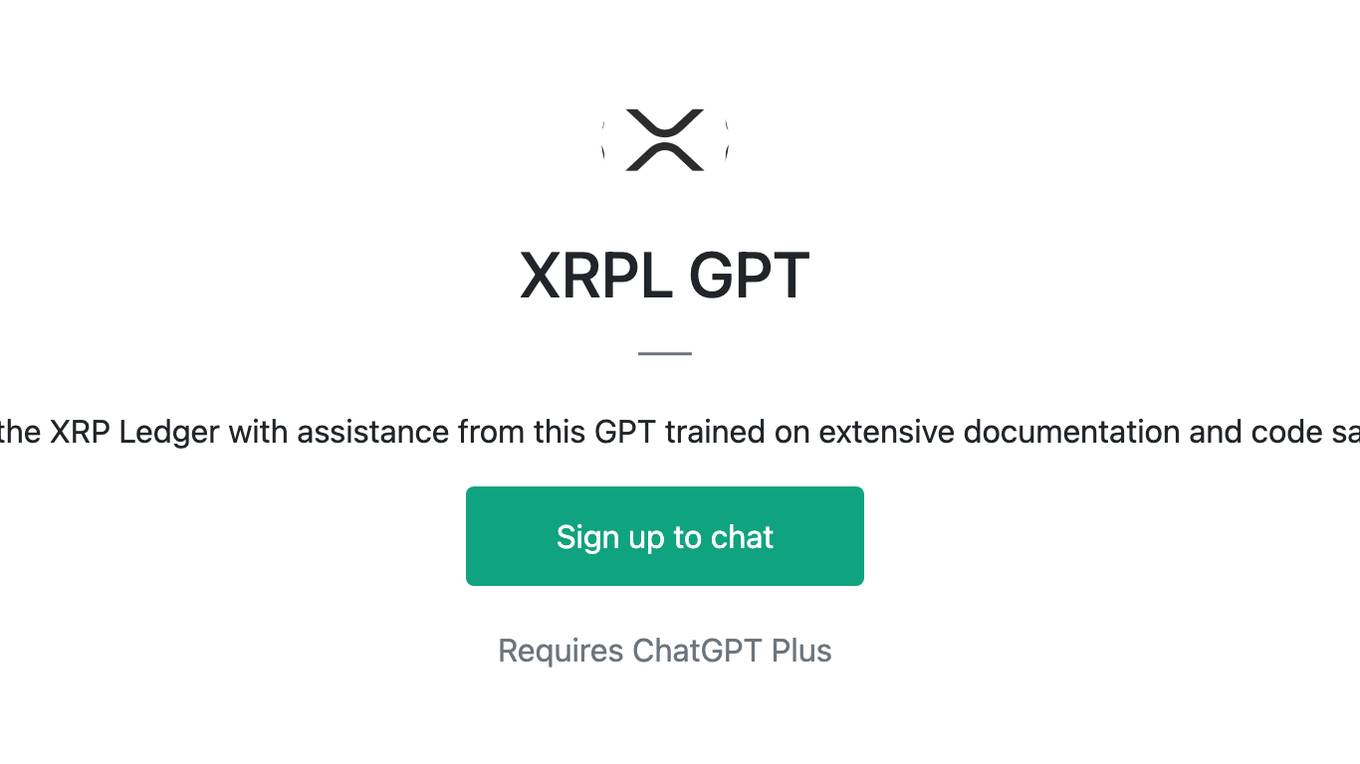
XRPL GPT
Build on the XRP Ledger with assistance from this GPT trained on extensive documentation and code samples.
